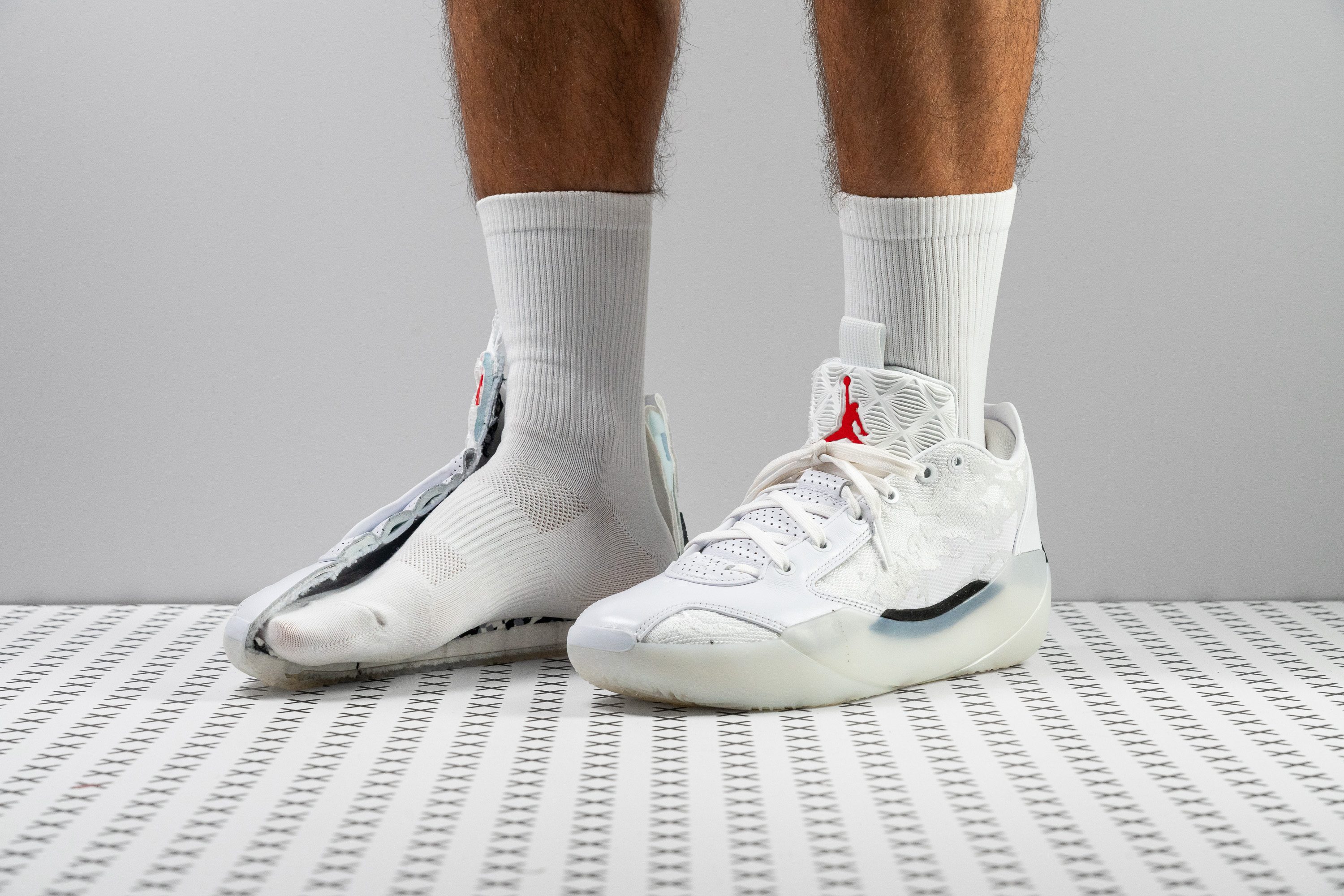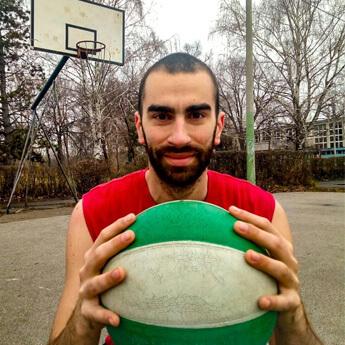Our verdict
Pros
- Unbelievable bounce and energy return
- Fantastic shock absorption and impact protection
- Couldn't be any more comfortable
- Great for static shooting drills
- Durable upper materials
- Nice traction
- Recycled content
- Cool old-school design
Cons
- Incredibly unstable
- Overworks your feet and ankles
- Midsole bottoms out prematurely
- Pricey
Audience verdict
- Top 13% in Jordan basketball shoes
- Top 30% in lightweight basketball shoes
- Top 19% most popular basketball shoes
Comparison
The most similar basketball shoes compared
+ + Add a shoe | |||||
|---|---|---|---|---|---|
| Audience score | 89 Great! | 89 Great! | 87 Great! | 88 Great! | |
| Price | $200 | $190 | $130 | $160 | |
| Signature | Michael Jordan | - | - | LeBron James | |
| Shock absorption | High | Moderate | High | Low | |
| Energy return | High | High | Low | Moderate | |
| Traction | Moderate | Moderate | Moderate | Low | |
| Top | Low | Low | Low | Low | |
| Ankle support | ✓ | ✓ | ✗ | ✓ | |
| Weight lab | 13.9 oz / 394g | 11.8 oz / 335g | 14.1 oz / 400g | 13.1 oz / 372g | |
| Lightweight | ✓ | ✓ | ✓ | ✓ | |
| Breathability | Warm | Warm | Warm | Moderate | |
| Outsole durability | Good | Good | Good | - | |
| Drop lab | 7.2 mm | 5.5 mm | 9.3 mm | 4.9 mm | |
| Heel stack lab | 27.1 mm | 27.0 mm | 34.9 mm | 26.9 mm | |
| Forefoot | 19.9 mm | 21.5 mm | 25.6 mm | 22.0 mm | |
| Size | True to size | True to size | Slightly small | True to size | |
| Midsole softness | Soft | Soft | Soft | Firm | |
| Stiffness | Moderate | Stiff | Moderate | Flexible | |
| Torsional rigidity | Moderate | Stiff | Stiff | Moderate | |
| Heel counter stiffness | Flexible | Flexible | Flexible | Flexible | |
| Width / fit | Medium | Medium | Medium | Medium | |
| Toebox width | Wide | Medium | Wide | Medium | |
| Midsole width - forefoot | Narrow | Average | Average | Very narrow | |
| Midsole width - heel | Narrow | Narrow | Average | Average | |
| Heel padding durability | Decent | Bad | Decent | Decent | |
| Toebox durability | Decent | Decent | Decent | Decent | |
| Insole thickness | Average | Average | Average | Average | |
| Outsole hardness | Average | Hard | Hard | Average | |
| Outsole thickness | Average | Average | Average | Average | |
| Heel tab | None | None | None | Finger loop | |
| Ranking | #18 Top 34% | #13 Top 25% | #30 Bottom 44% | #24 Top 45% | |
| Popularity | #10 Top 19% | #3 Top 6% | #6 Top 12% | #35 Bottom 35% |
Who should buy
Don't let the Air Jordan XXXIX fly away from you if you're looking for:
- The bounciest of bouncy hoopers (Air Unit + ZoomX combo).
- An incredibly comfortable shoe that will shield your feet from impact.
- A new partner for your static shooting drills.
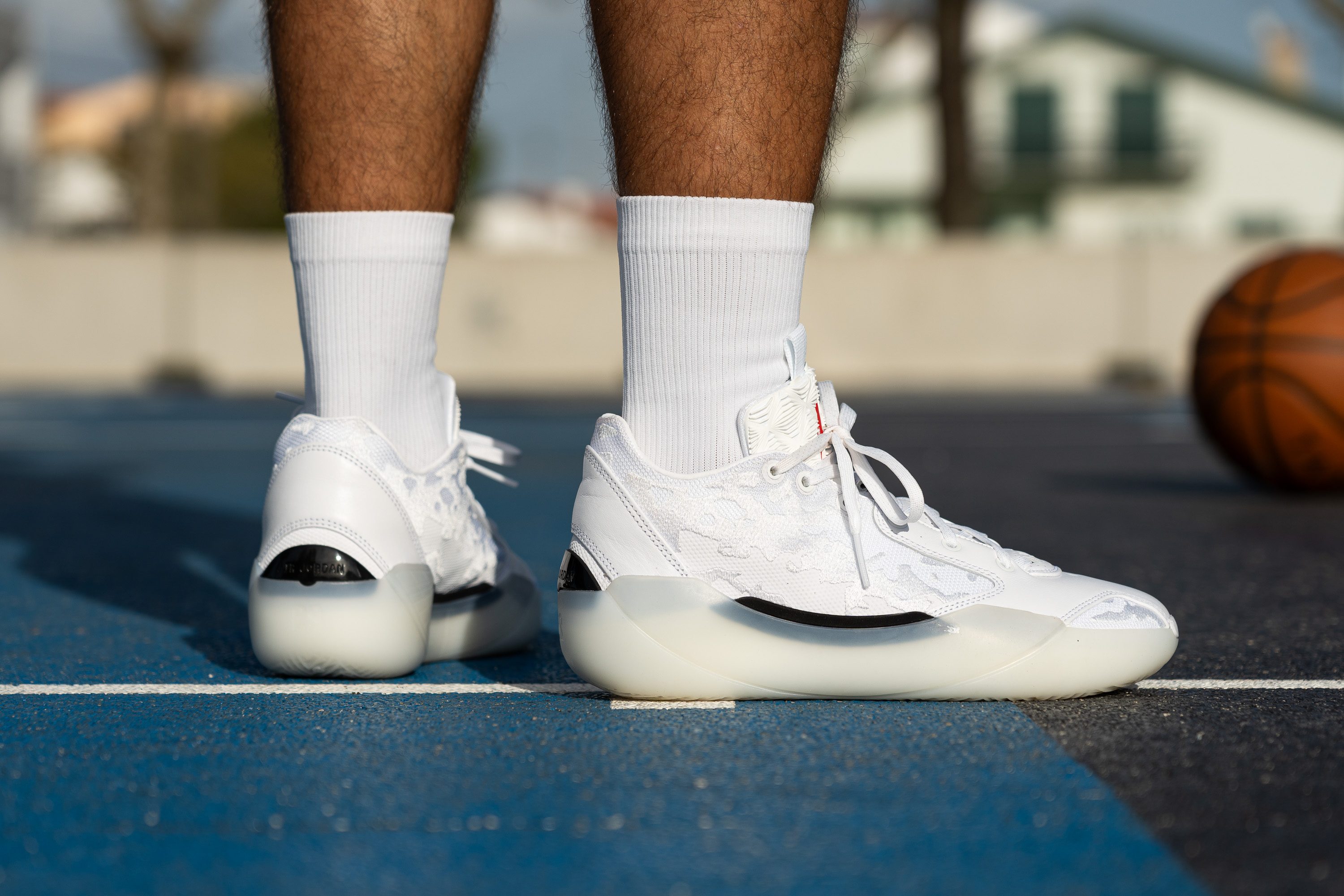
Who should NOT buy
After comparing our personal experiences during our wear tests, we've agreed this AJ feels really unstable on foot. Its midsole is super explosive, but the shoe itself doesn't include any kind of stopping mechanism (like stability features) so going for powerful layups or quick cuts felt too dangerous.
This ended up making our ankles and feet muscles work so much, that they ended up really tired once we were done playing. As an alternative, we believe you could try the incredibly supportive Jordan Luka 2, or the Nike G.T. Jump 2, which also has an incredibly powerful energy return.
If these pairs are too pricey for you, you can always play with our filters and select cheaper hoopers! Here you have the cheapest ones we've analyzed to far.
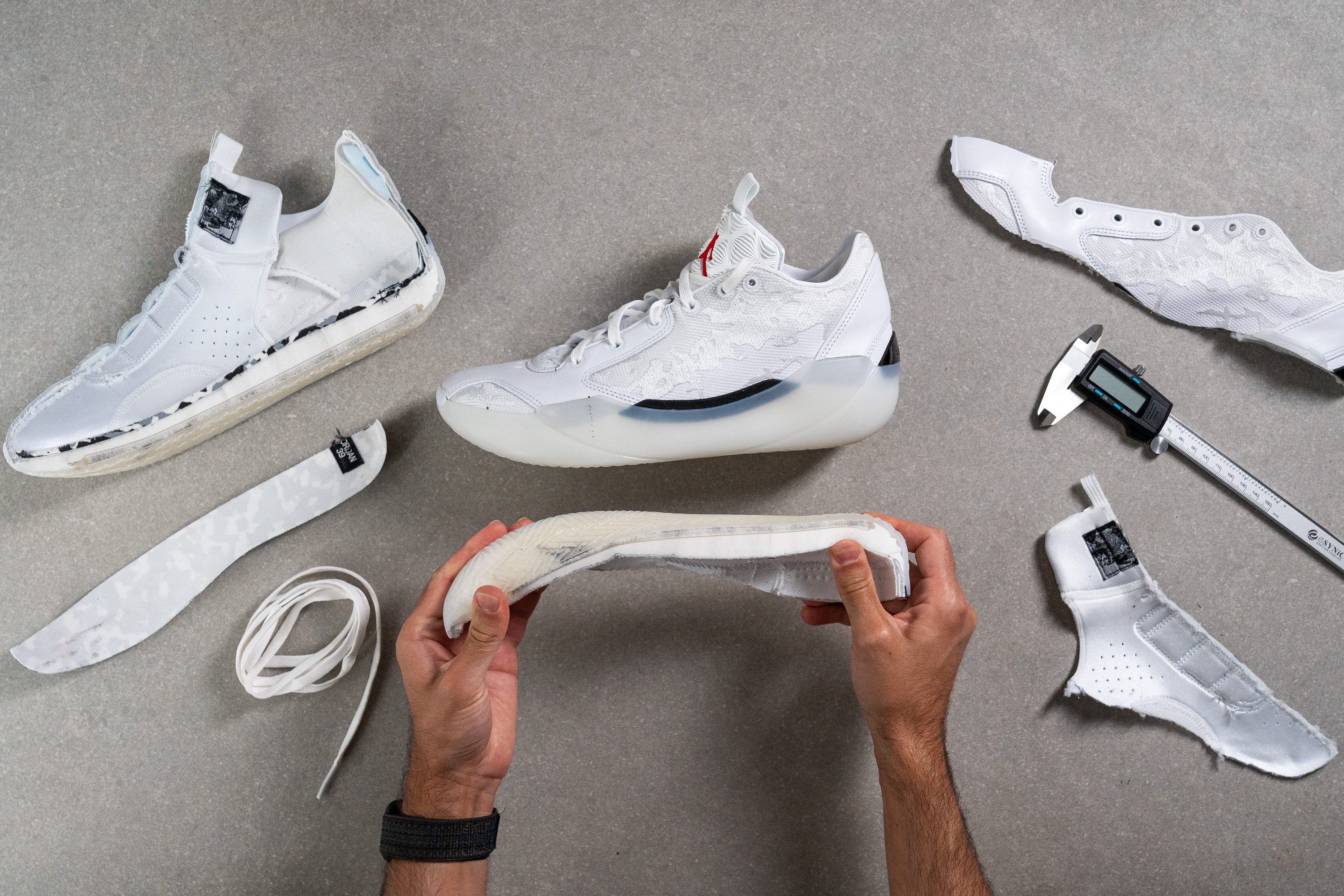
Cushioning
Shock absorption
The use of Nike's most advanced ZoomX superfoam brings basketball shoe cushioning to a whole new level!
Measuring the impact that the XXXIX's midsole can attenuate, we recorded an exceptionally high reading of 118 SA in the heel. And the fact that its forefoot showed just a standard shock absorption of 84 SA didn't make this Air Jordan shoe any less comfortable.
It is some of the best-cushioned hoop shoes that feel very easy on the feet and joints and fight off fatigue for all four quarters.
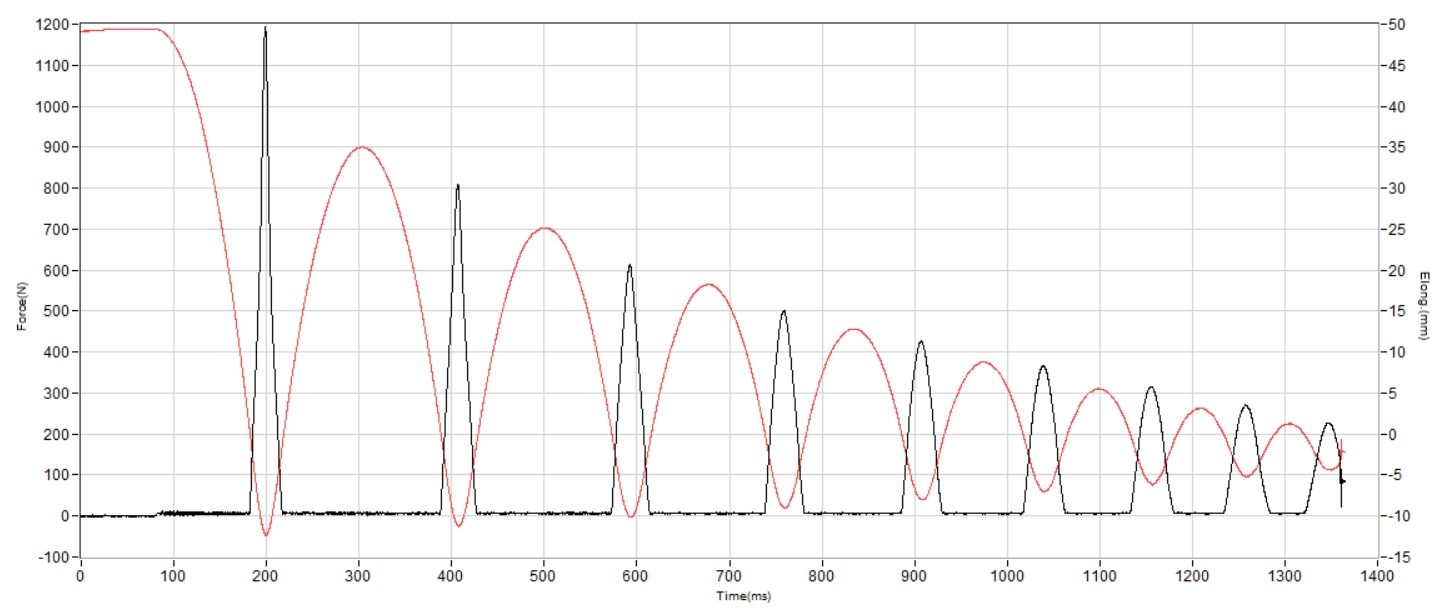
| Air XXXIX | 118 SA |
| Average | 103 SA |
Energy return
The winning combination of ZoomX foam and Zoom Air units brings the explosiveness of Nike's top-tier running shoes to the basketball court.
Expect the XXXIX to feel like an actual bounce castle with an above-average energy return of 67.8% in the heel and a whopping 74.9% in the forefoot! This shoe makes each step feel incredibly charged, but unfortunately, it comes at the price of stability.
| Air XXXIX | 74.9% |
| Average | 62.1% |
Heel stack
Measuring the heel stack of this Jordan, our caliper returned 27.1 mm.
But the fact that this shoe has a lower heel stack compared to the average does NOT mean the cushioning is worse! In fact, it's completely the opposite: the Air Jordan XXXIX felt unbelievably comfortable and soft underfoot.
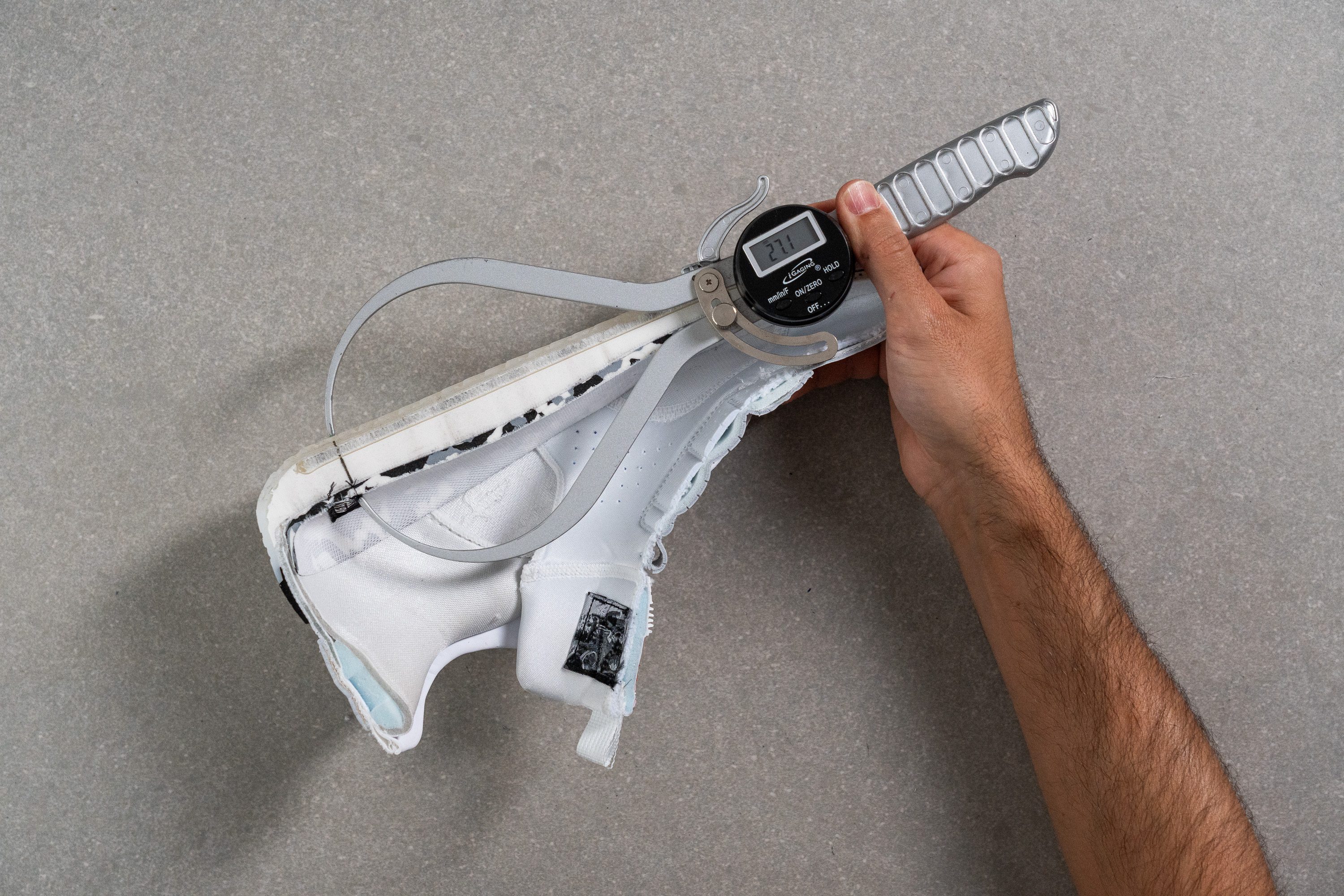
| Air XXXIX | 27.1 mm |
| Average | 28.8 mm |
Forefoot stack
The forefoot stack goes down the same road with a moderate caliper reading of 19.9 mm. But once again, we never felt like this AJ lacked comfort or protection.
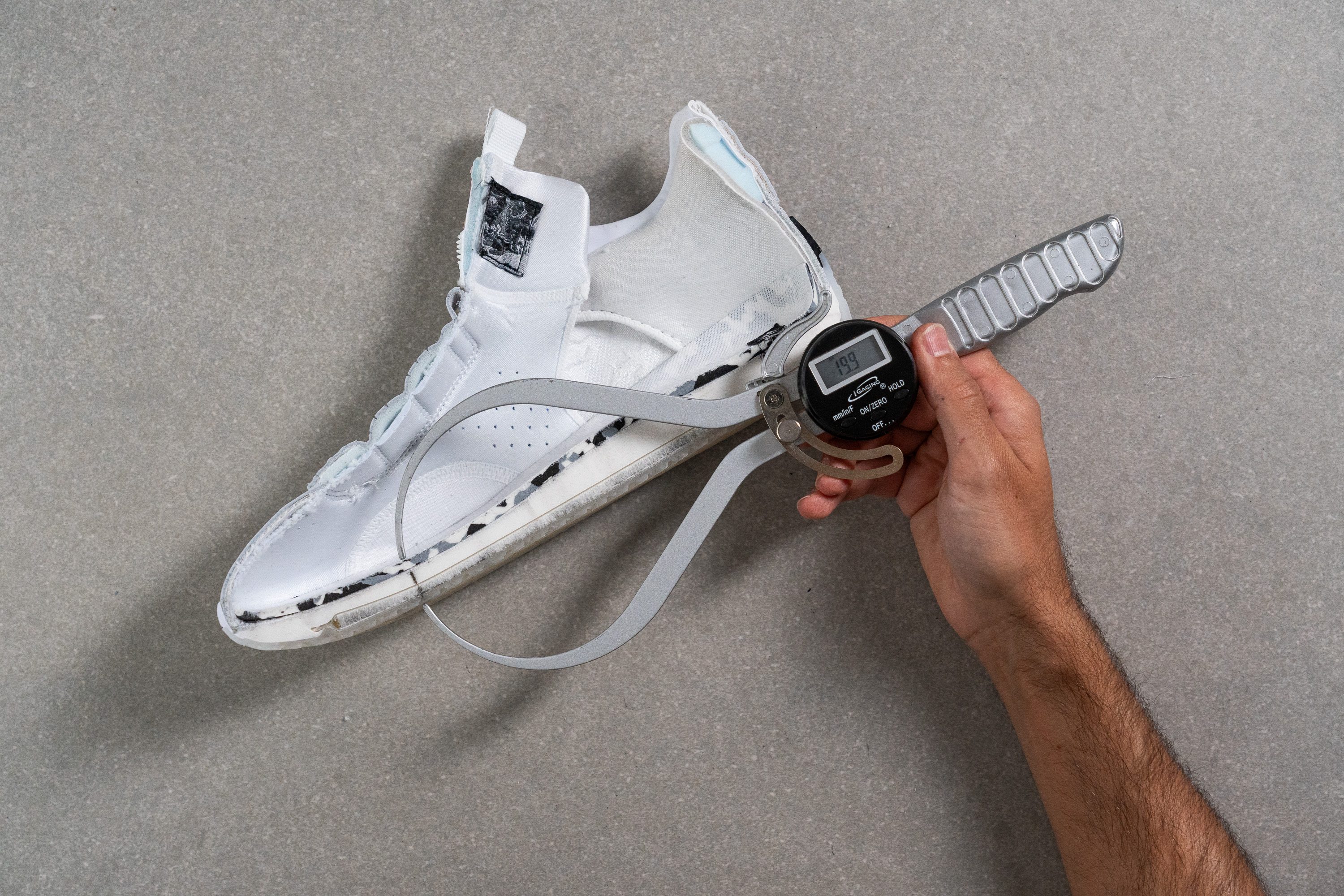
| Air XXXIX | 19.9 mm |
| Average | 21.4 mm |
Drop
Both these measures leave us with a drop of 7.2 mm, which is pretty much average. The heel is only moderately elevated above the toes.
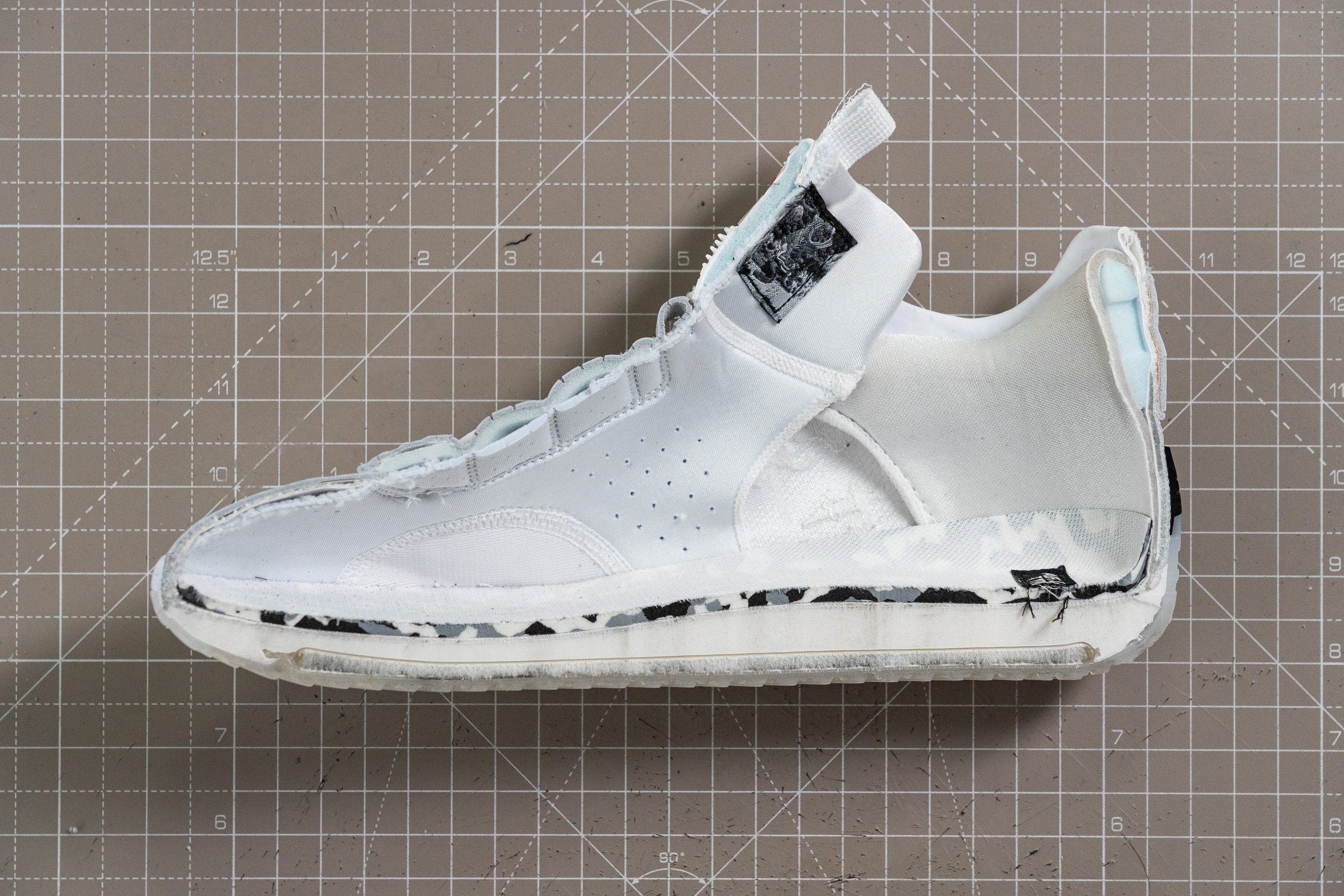
| Air XXXIX | 7.2 mm |
| Average | 7.4 mm |
Midsole softness
With all the comfort we experienced playing in the AJ XXXIX, we weren't even a little bit surprised when our durometer marked 16.5 HA. It is some of the softest measurements we recorded among basketball shoe foams.
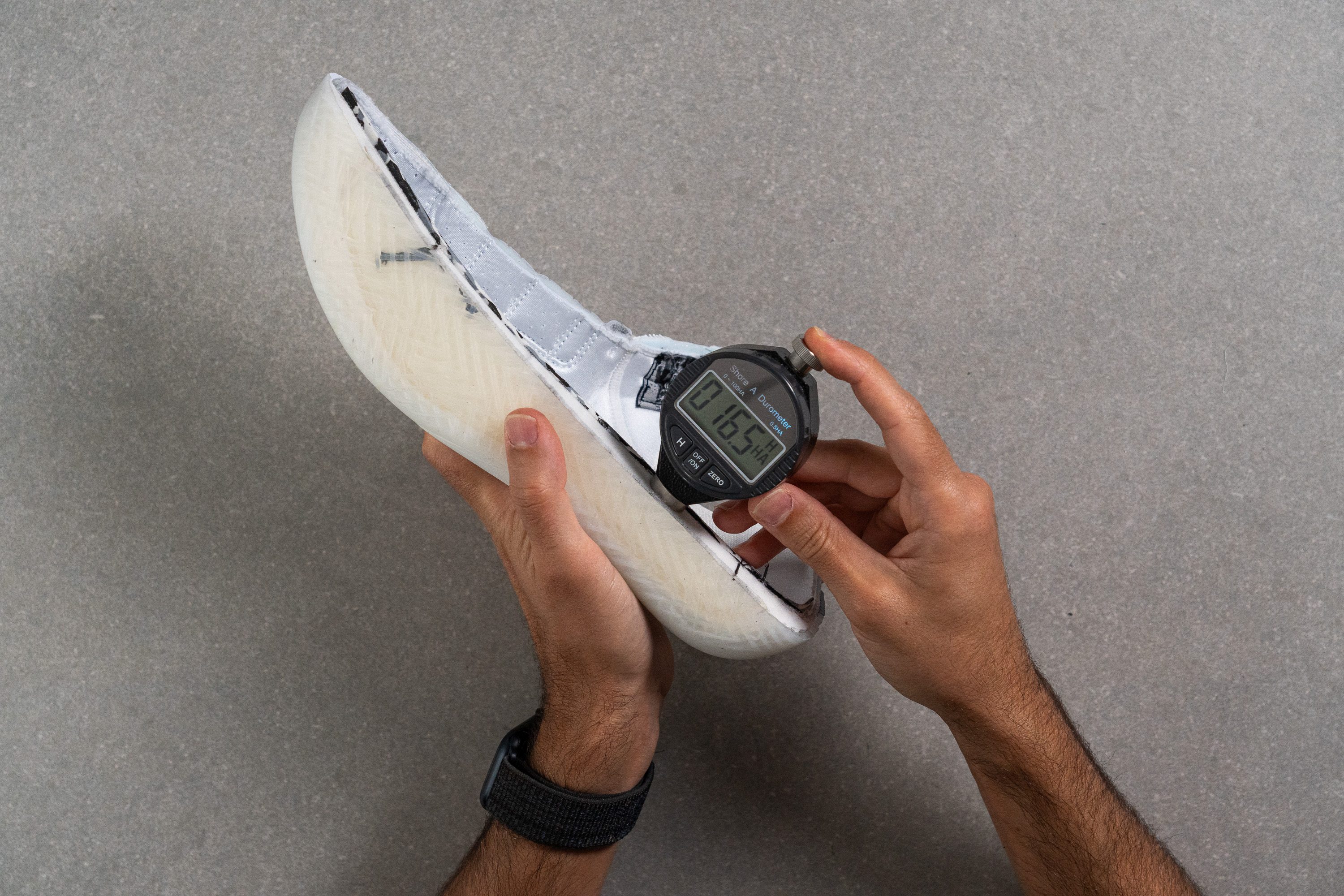
You see, it just combines Nike's ZoomX premium foam with a full Air Unit, so it basically feels like flying and then landing on clouds.
Nevertheless, as we specify on our ultimate guide about foams, the major drawback of the ZoomX is its durability. Consequently, what you feel the first days you're playing in this shoe compared to some time later on (just depending on how much you play per day) will be totally different.
The same equation works if you change the unknowns. Take a heavier player, for example, and change it for the extra time played. That added weight on the midsole will definitely make the ZoomX wear out sooner if we compare it with its use by a lighter player.
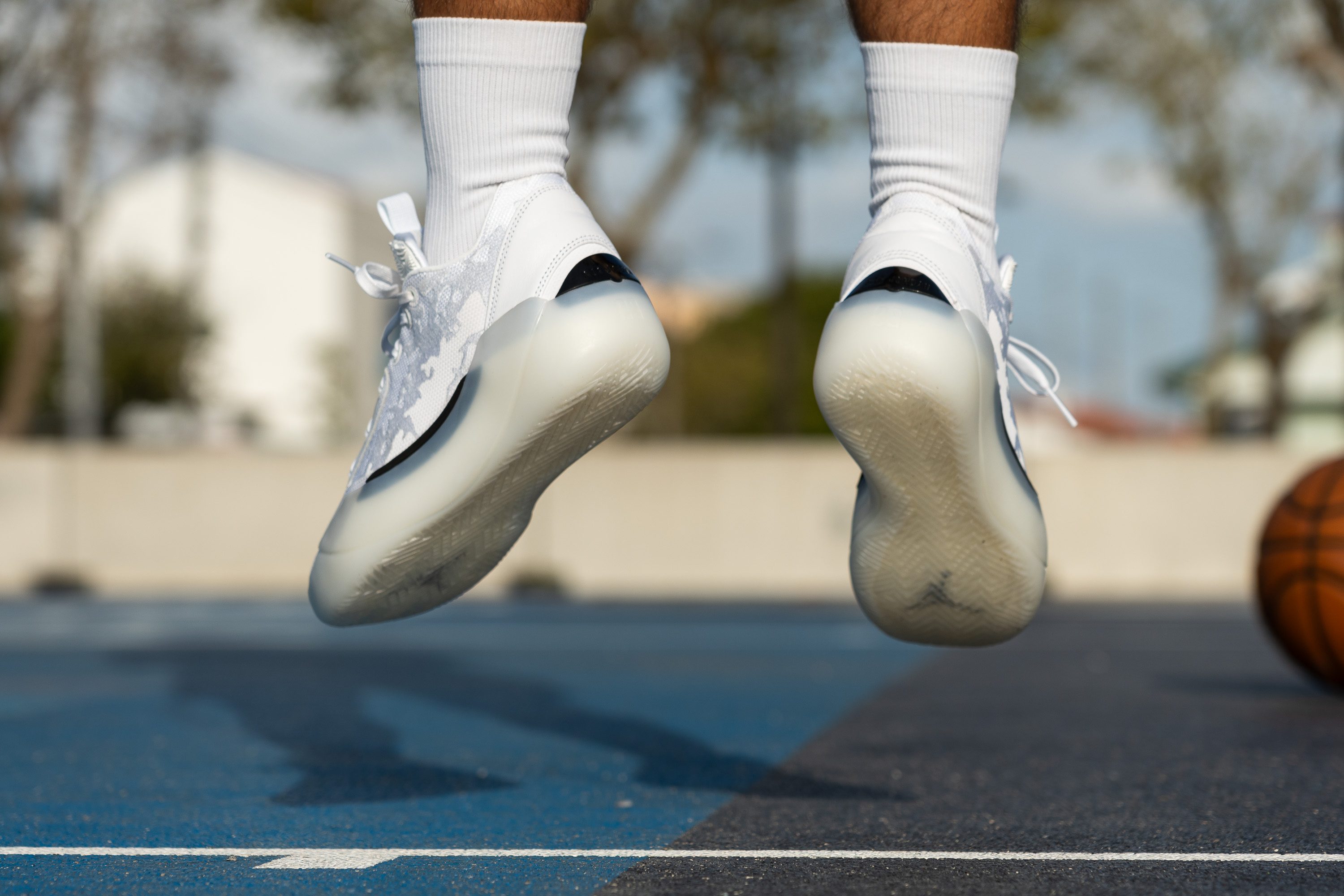
Alright, with all this being said, we gotta admit this setup looks and feels wonderful comfort-wise. Nevertheless, if we focus on the stability provided... Nike, why on Earth didn't you add a shank!? It was just as simple as adding a couple of stability features, and you would have one of the craziest hoopers of the year. So... what happened in there?
Well, in our opinion, the fact that the AJ XXXIX doesn't have a shank jeopardized its playability from top to bottom. During our wear tests, when we went for aggressive cuts or quick lateral moves, our feet didn't seem to find the right balance. Let us say it straight: to us, this shoe felt unstable.
| Air XXXIX | 16.5 HA |
| Average | 24.3 HA |
Size and fit
Size
Air Jordan XXXIX fits true to size (58 votes).
Internal length
| Air XXXIX | 270.9 mm |
| Average | 271.7 mm |
Width / Fit
The AJ XXXIX treated our feet to a pretty accommodating fit in a D medium width. The same was also confirmed by our precise measurements of the shoe's gel mold.
Having created a replica of the shoe's interiors using proprietary gel, we measured its widest area at 94.7 mm. This is slightly above the average and feels comfortably non-restricting on foot.
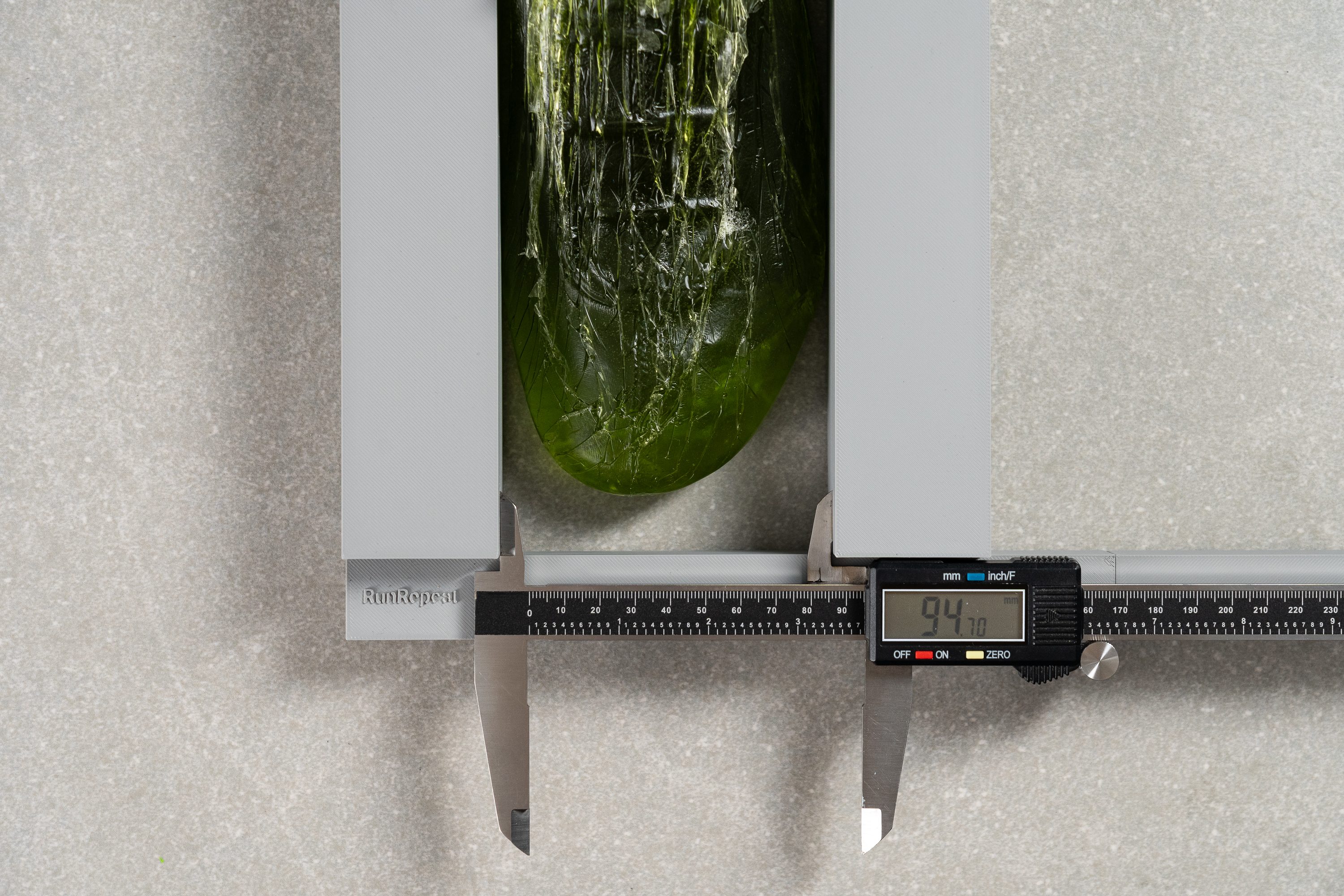
| Air XXXIX | 94.7 mm |
| Average | 92.8 mm |
Toebox width
The mold also revealed the shoe's slightly rounded toebox shape which showed an above-average width of 72.6 mm near the big toe.
A non-pointy toebox like this eliminates the risk of toe jamming or numbing.
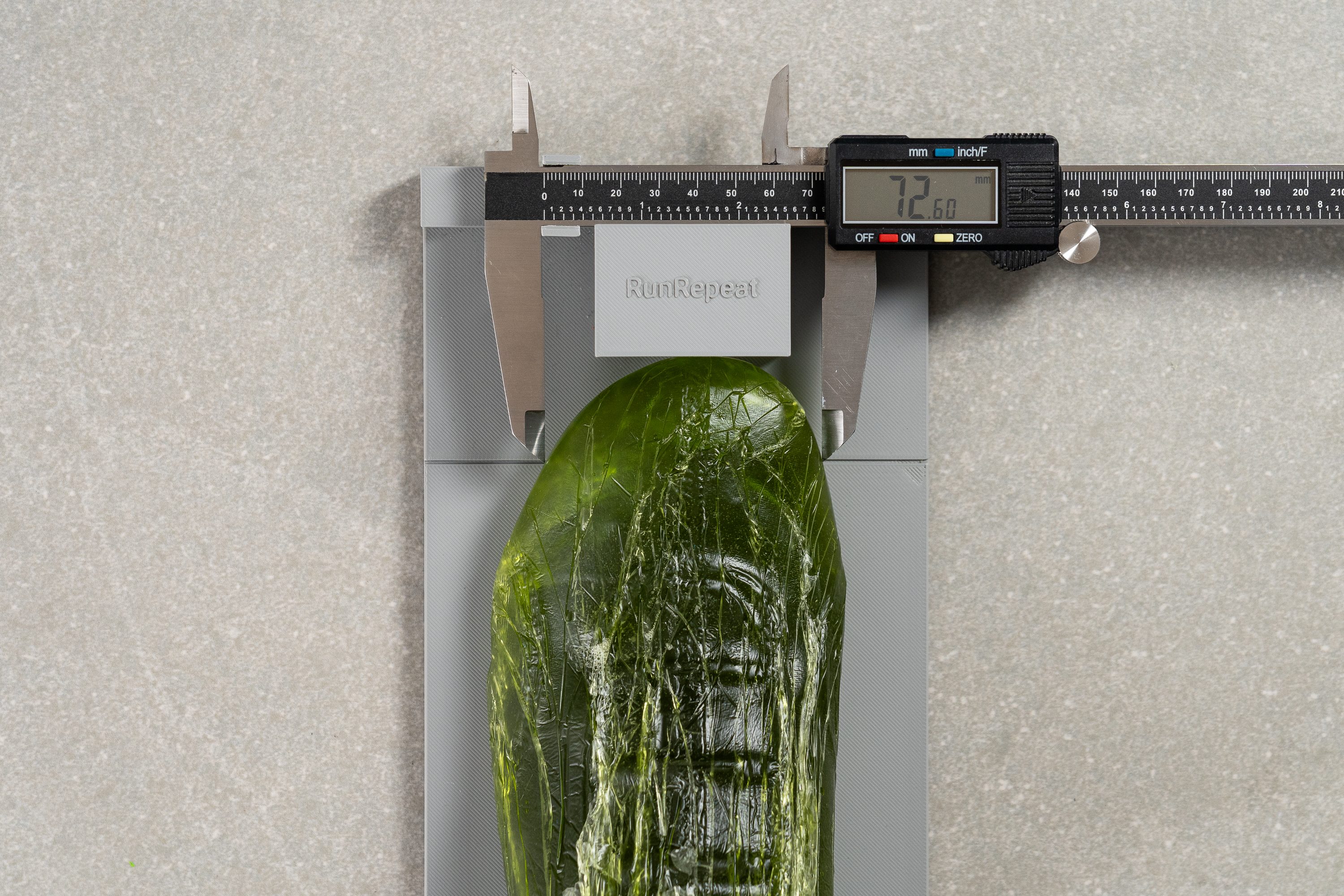
| Air XXXIX | 72.6 mm |
| Average | 69.3 mm |
Toebox height
This basketball shoe should not aggravate any painful toenail conditions either with its ample space above the toes. Our caliper returned a standard toebox height of 24.0 mm.
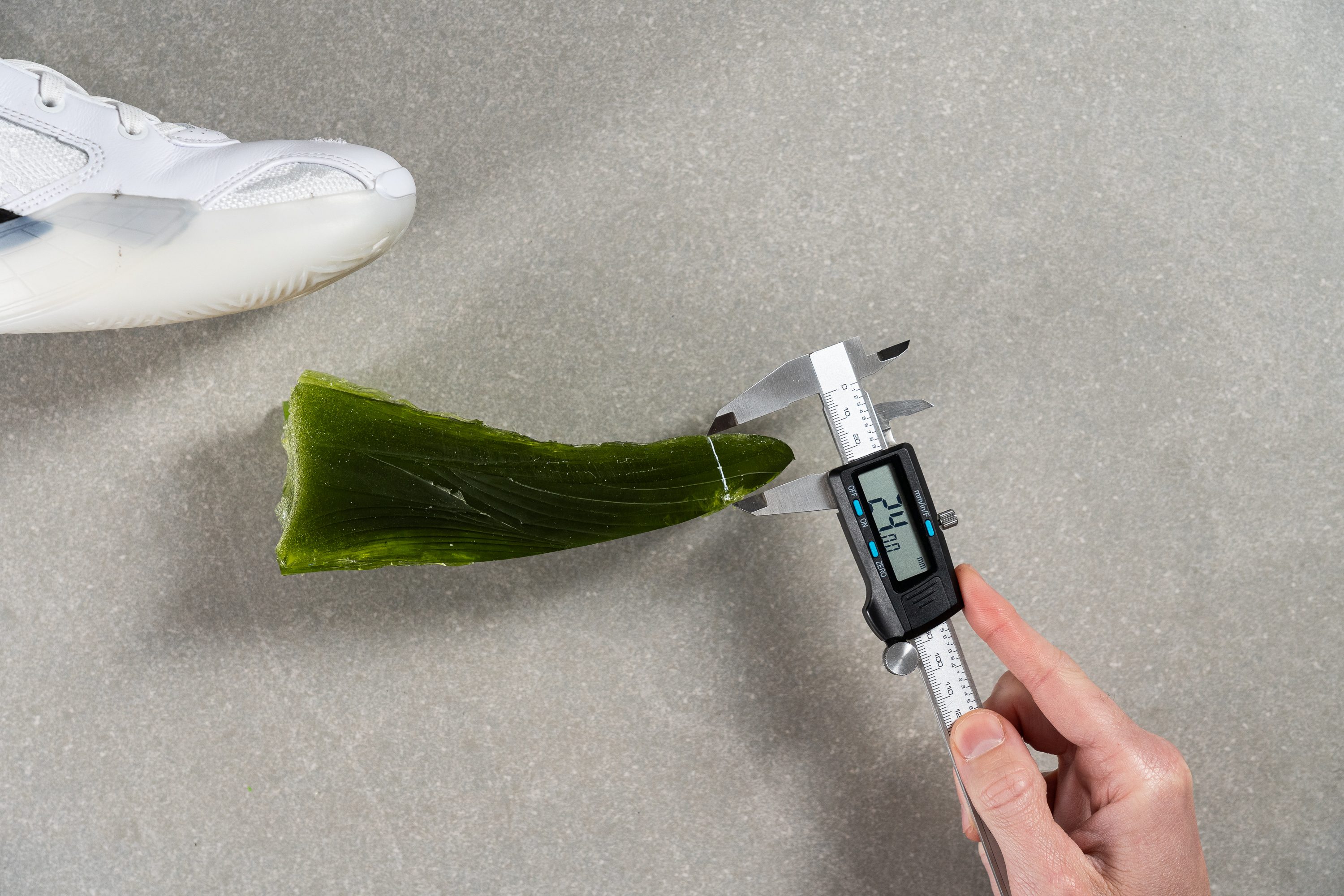
| Air XXXIX | 24.0 mm |
| Average | 23.5 mm |
Traction / Grip
Forefoot traction
Sliding the XXXIX's forefoot against a piece of pro court surface, we recorded a solid friction coefficient of 0.77. This implies a very adaptable and reliable grip for various on-court situations.
| Air XXXIX | 0.77 |
| Average | 0.75 |
Outsole design
This Air Jordan shoe features a translucent rubber outsole with a herringbone tread pattern which is optimized for indoor courts. However, we found it too soft and thin for abrasive blacktops.
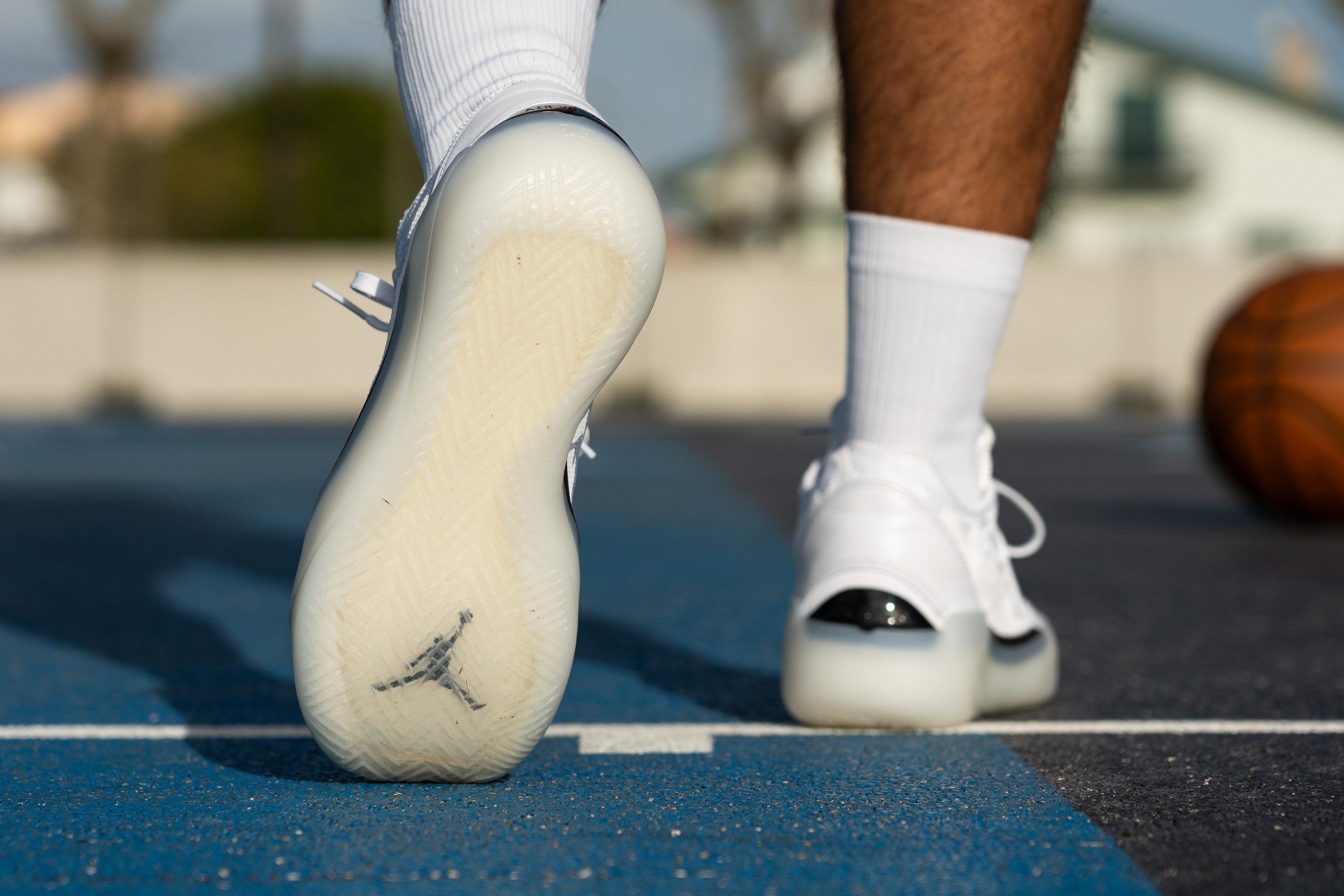
Flexibility / Stiffness
Given the lack of rigid components in this Jordan shoe, we didn't expect to see a high reading on our flex testing machine.
Even a sightly below-average reading of 19.3N surprised us because this hoop shoe is definitely more about comfort than it is about the snappiness and support associated with stiffer shoes.
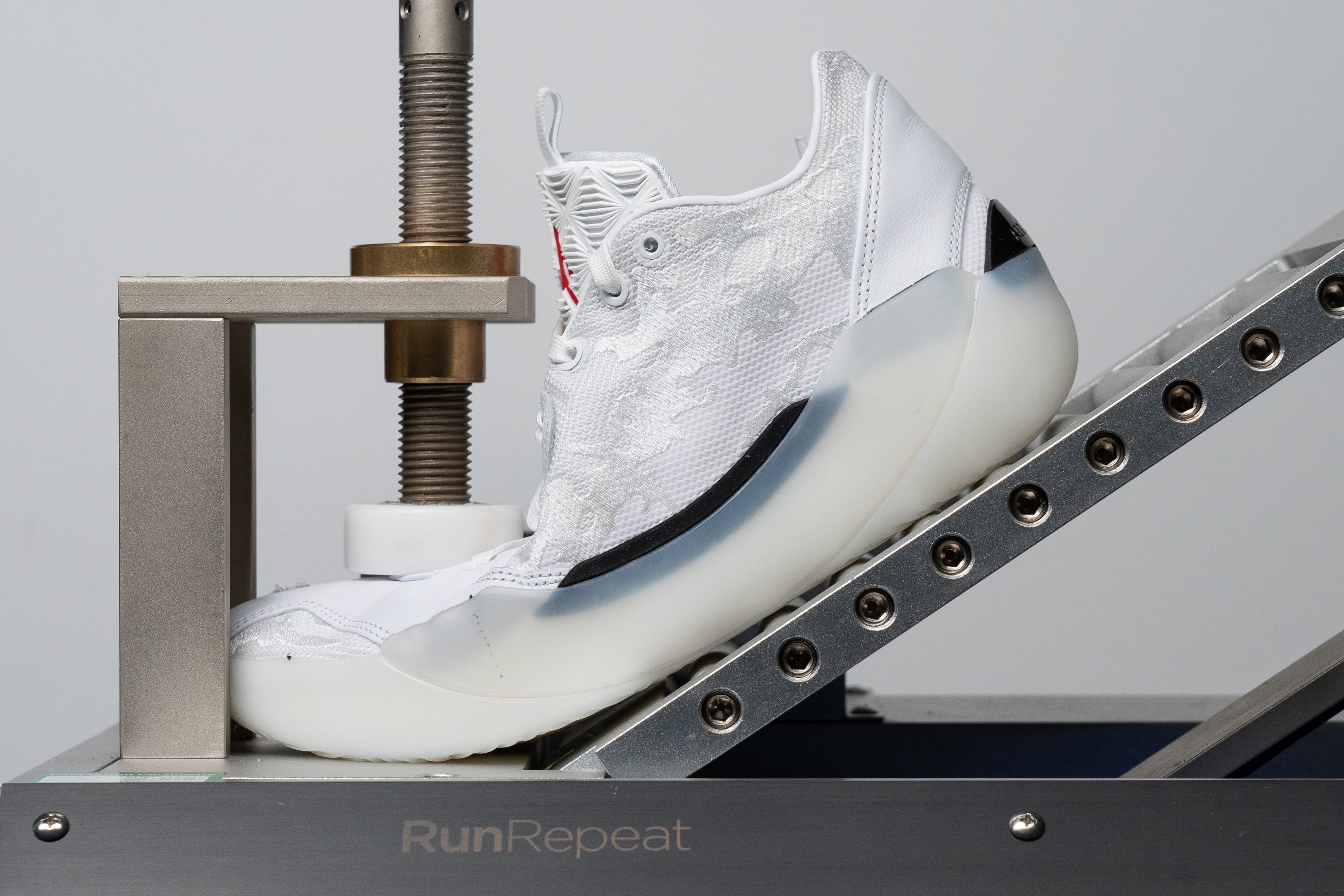
| Air XXXIX | 19.3N |
| Average | 20.5N |
Weight
Following our experience playing basketball in this newest AJ during our wear tests, we can't say it's the most nimble shoe out there, but it doesn't feel heavy either.
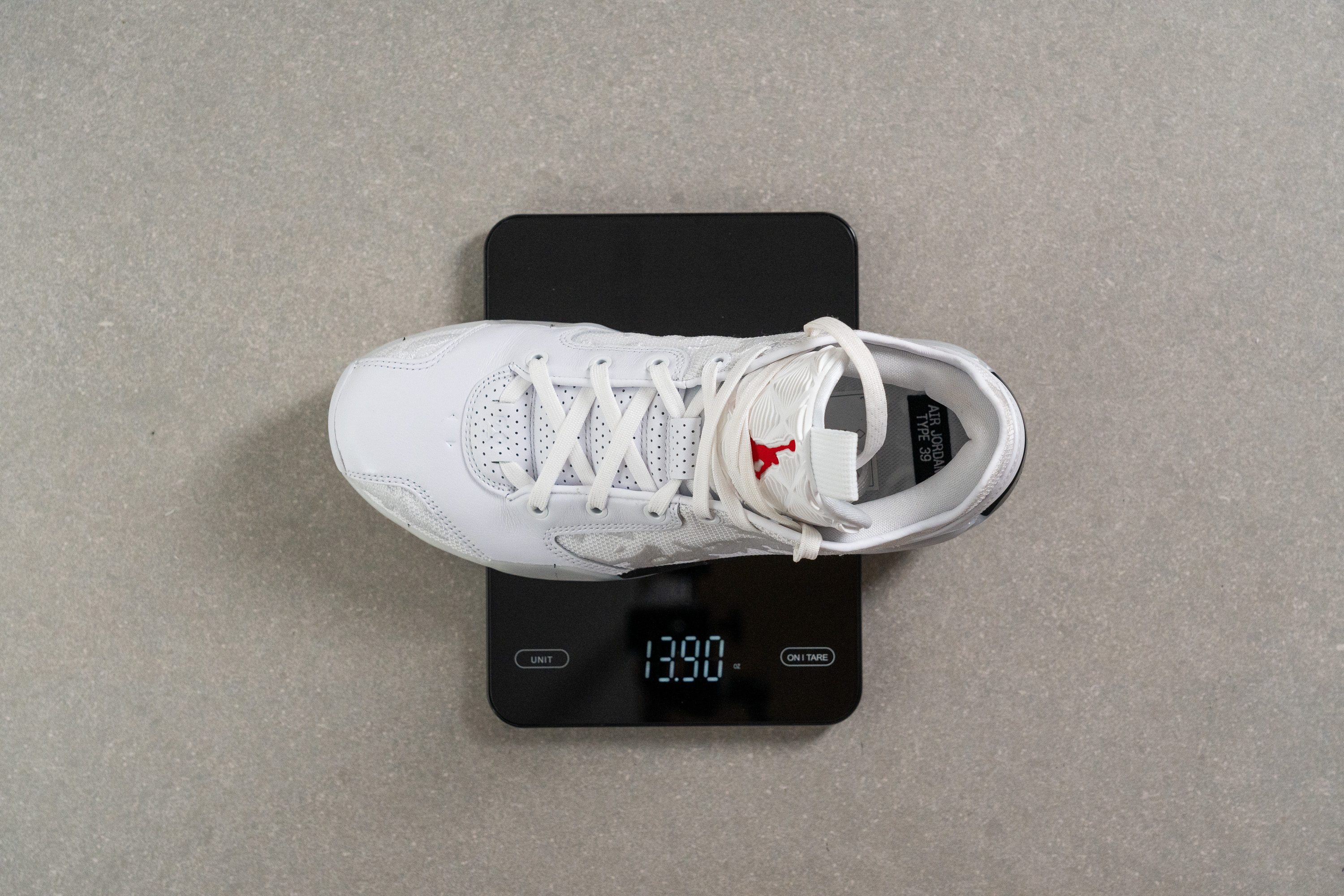
As our scale stated when we went back to our lab, a weight of 13.9 oz/394.0g is just average. That's why this shoe felt neither like ballast nor like a couple of feathers when we ran up and down the court.
The thing is... those times when we had to run because of some crazy fast break, we didn't really feel stable in the shoe. Listen, it even got to the point where stopping in the blink of an eye and changing directions felt rather unsafe for us.
| Air XXXIX | 13.9 oz (394g) |
| Average | 13.8 oz (391g) |
Breathability
After playing basketball for a while with this shoe during our wear tests, we could feel our feet begging for air. The more we played, the hotter things got, and our toes ended up almost swimming because of how much we were sweating!
To check this in the lab, we started with our light test. We put a cut part of our upper right in front of our light, but none of it could actually get through its material. Like, at all.
So we decided to try using our smoke machine. We pumped smoke into the non-cut shoe to see how much of it would stay inside, and if it left the shoe, at what speed and from where.
When we saw this, we had to recheck if our machine was on. What do you mean there's literally NO smoke coming through the upper!? Not even a shy little column, nothing! We couldn't believe our eyes, but with this clear as crystal demonstration, we didn't even need to compare the results of this Air Jordan to the Curry 10's, which scored a perfect 5/5 on this test.
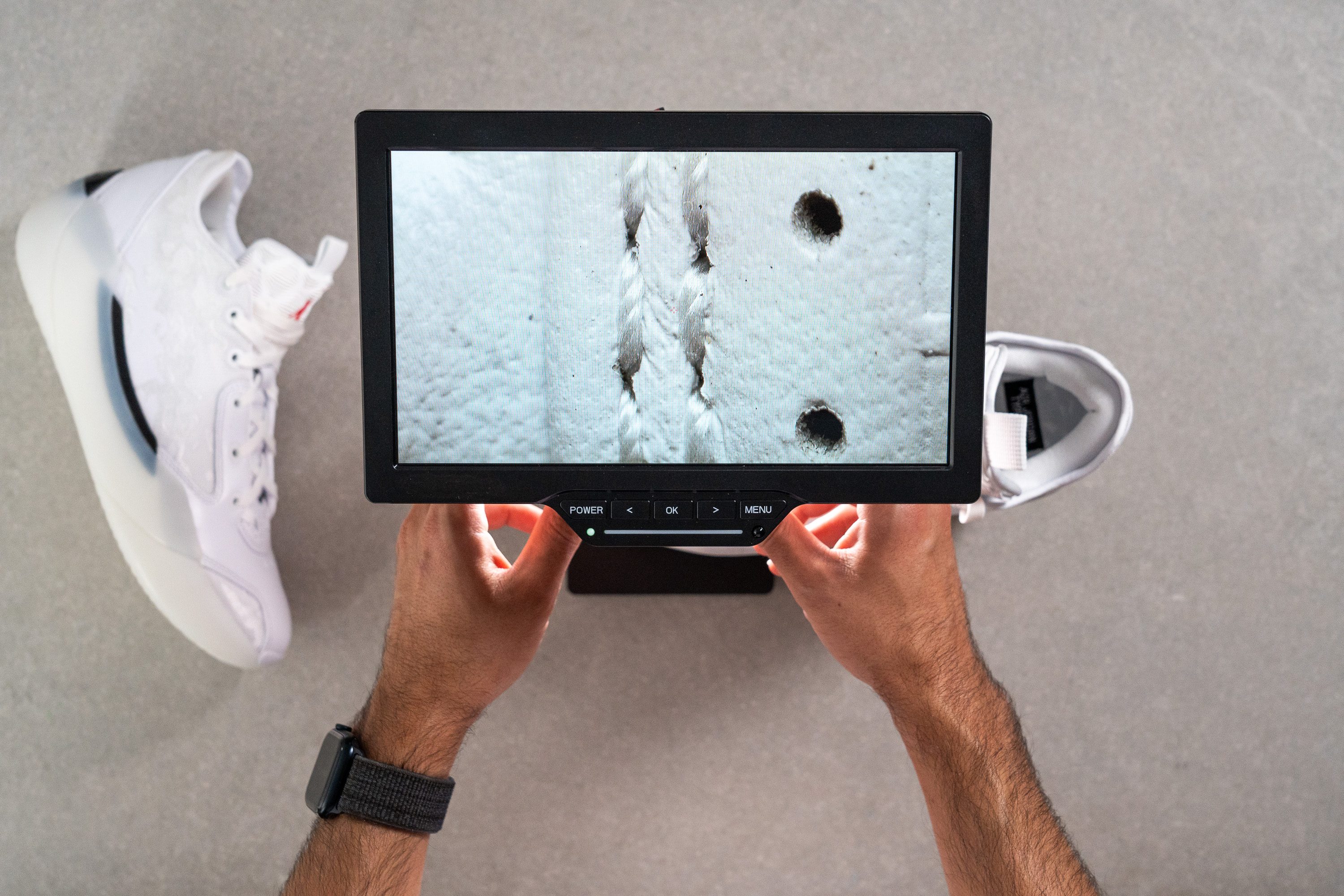
Our microscope close-up might be showing us holes. But, as usual, many of them have layers underneath that don't let the air go in and out easily. Additionally, this leather material is not made to let feet breathe happily.
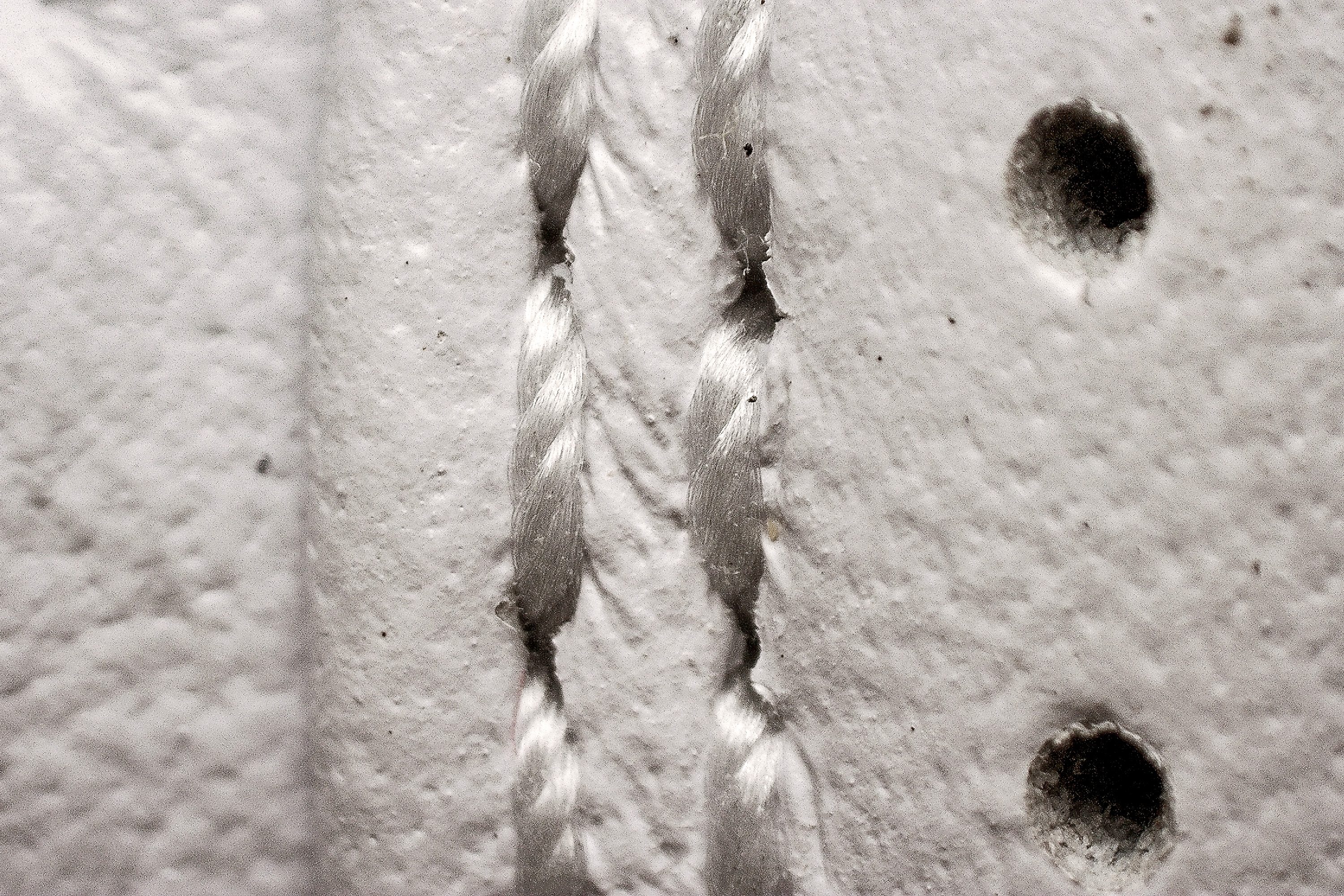
After this underwhelming performance, we have given the Air Jordan XXXIX a 1/5 on our breathability test. And trust us, if we could give it a 0 or a -1, we really would!
| Air XXXIX | 1 |
| Average | 2.5 |
Stability
Lateral stability test
In terms of lateral stability... there's pretty much none on the Air Jordan XXXIX.
As we mentioned a couple of sections before, this shoe feels really unstable. During our wear tests, we had to be extra careful when we stopped suddenly, so back-door cuts literally felt like a threat. One way to put it is that we felt as if there was nothing there to stop our feet from overextending every move.
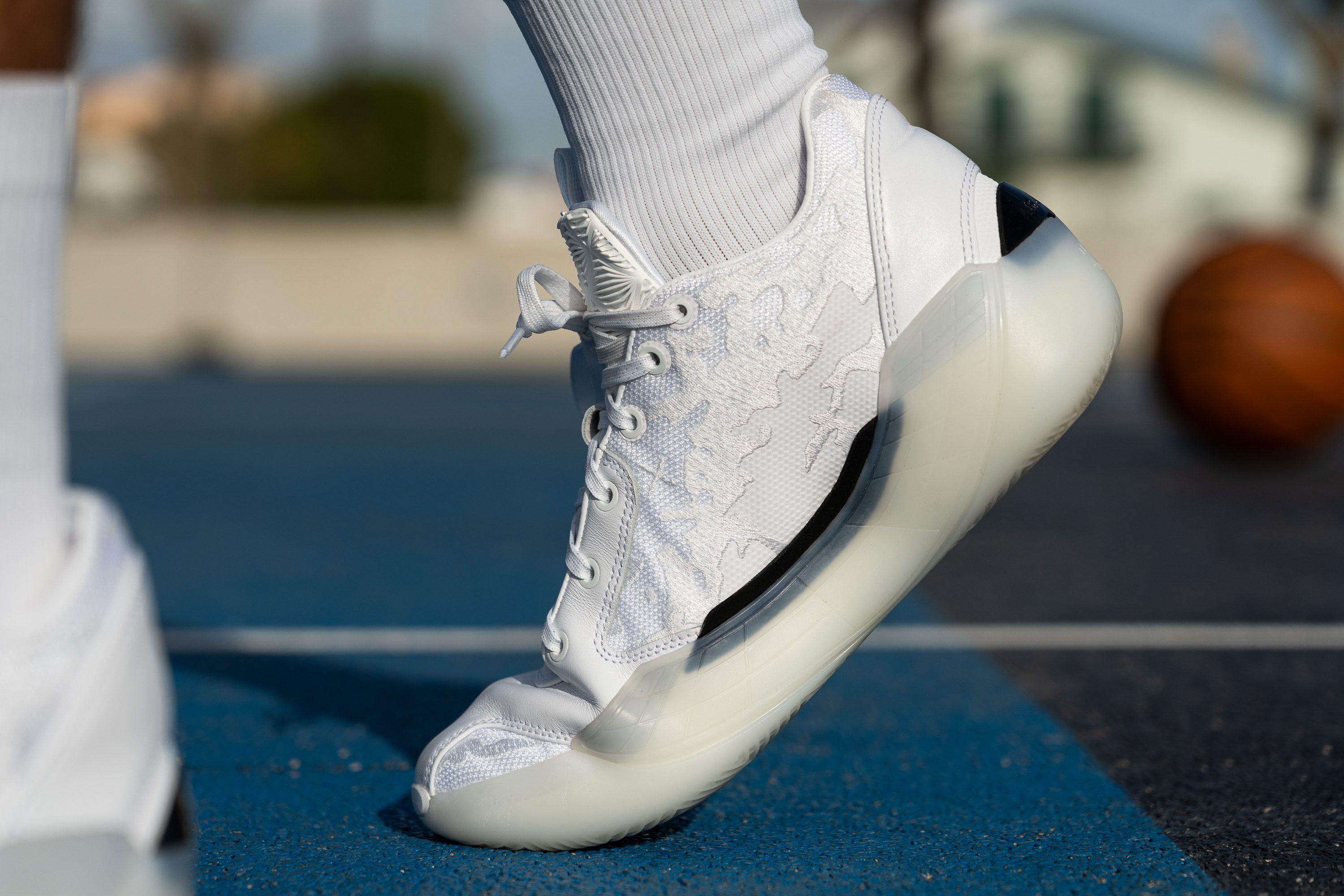
After thinking about it and comparing experiences, we believe that's why our feet were so tired after playing. Ankles and all! You know, the soft and bouncy midsole of this AJ is like a limitless power source, and there was nothing to stop its energy from being dangerous but our own feet. So our muscles and joints had to make an extra effort that, in other pairs with stability features, might not be as necessary.
Torsional rigidity
The rubber walls made us give this shoe a 4/5 on our torsional rigidity test.
Nevertheless, it's not hard rubber. It does make it hard for our fingers to twist it, but the experience on foot is different. That's why we believe it's really important to test every single pair in and outside our lab!
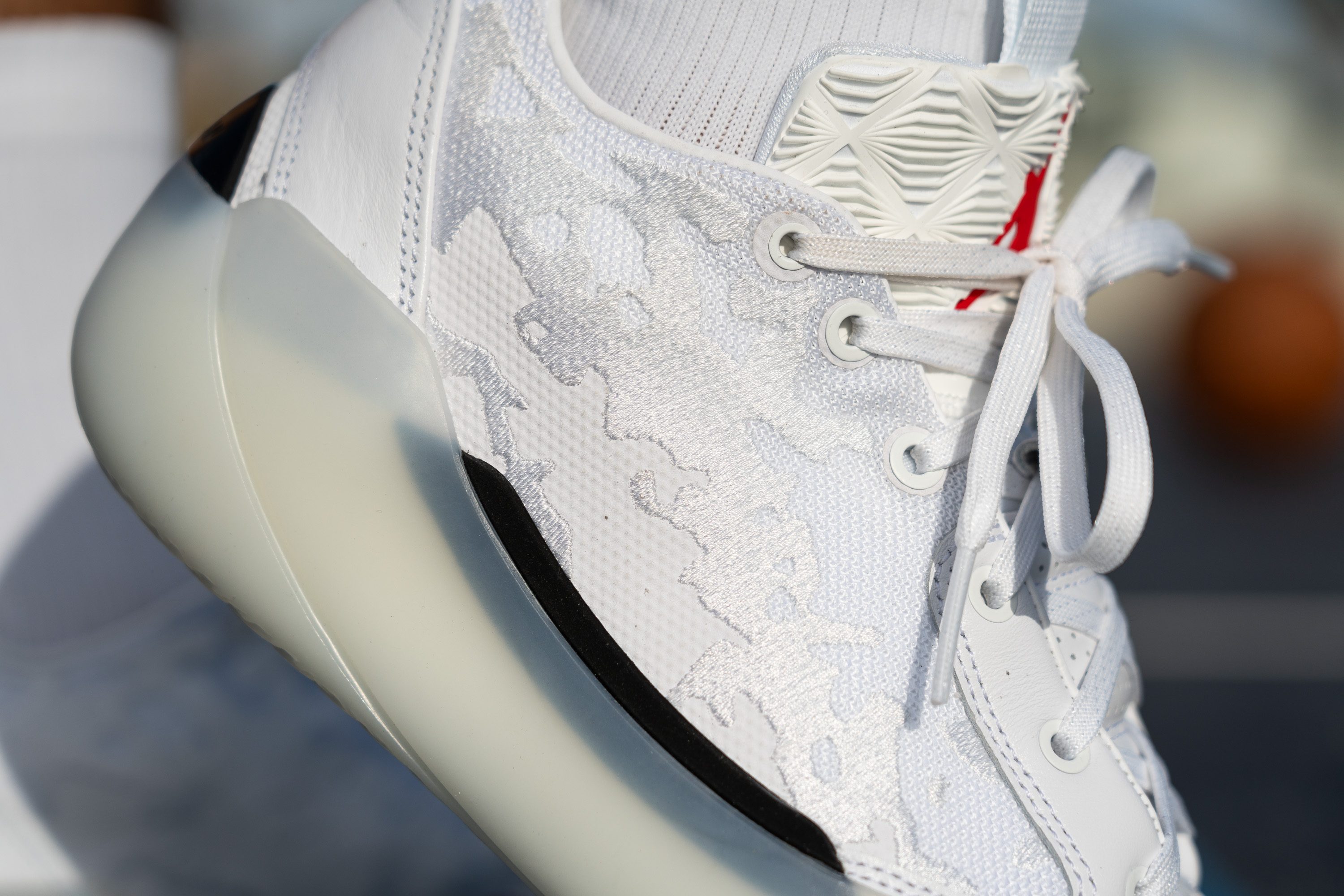
There are other hoopers that feature tough materials or specific details in order to improve lateral stability (like the Jordan Luka 2, for example). These pairs usually get a 5/5 on this same test, but the thing is that our hands and our feet feel the same: protection! In the case of the AJ XXXIX, even though our fingers struggled to bend it, our feet felt they could collapse at any moment.
| Air XXXIX | 4 |
| Average | 4.5 |
Heel counter stiffness
We couldn't rely on the heel counter for support either.
Its padded structure bent easily when we pushed it during our manual test, and the shoe doesn't feature an internal or external plastic (or any other stiff material) piece to add stability.
| Air XXXIX | 3 |
| Average | 3.8 |
Midsole width - forefoot
After everything we've said about the lack of stability and balance, you might be thinking: "Ah well, maybe Nike went for a wide landing base to try to compensate for the lack of supportive elements". Well, we're sorry to tell you this, but... you couldn't be more wrong.
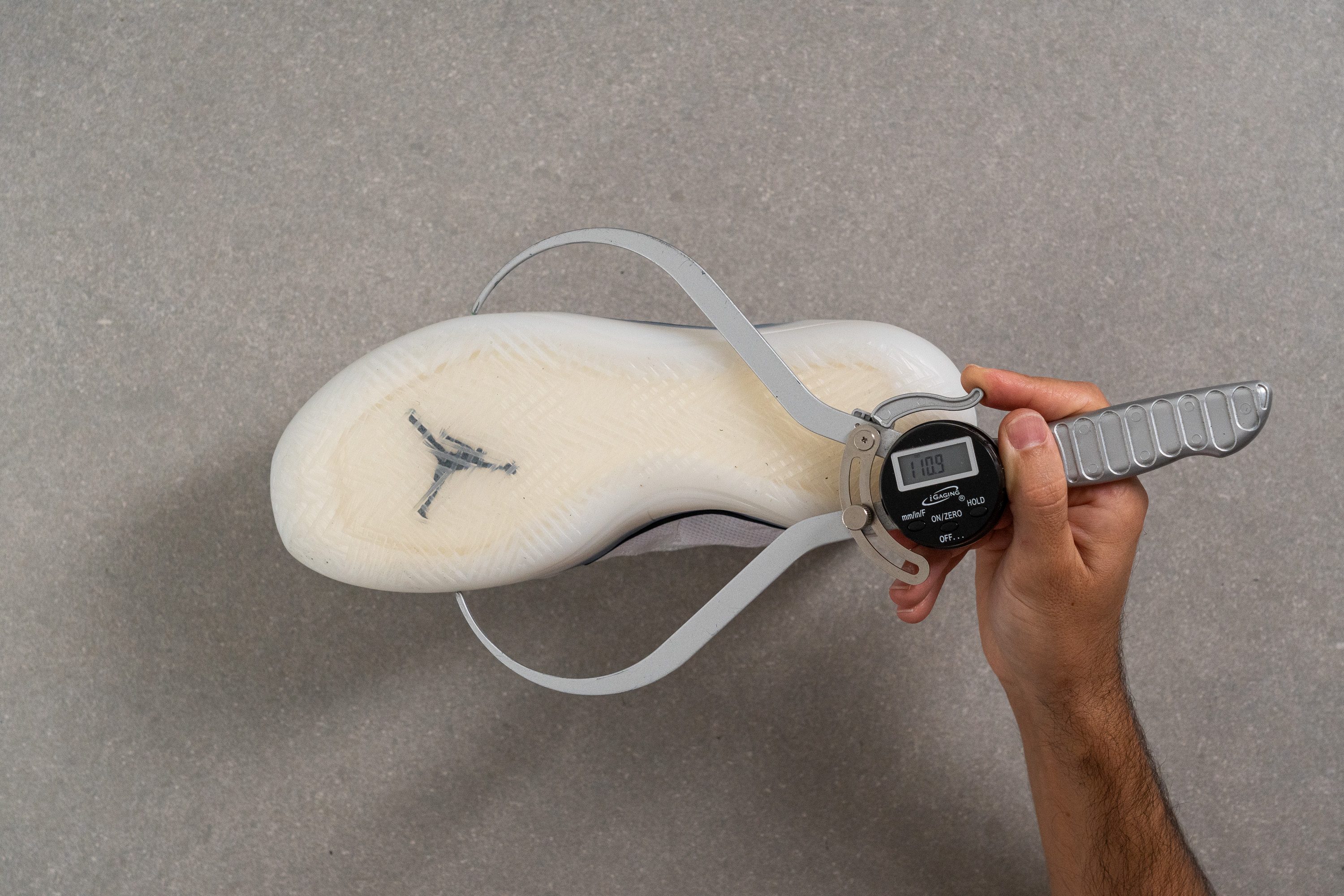
At 110.9 mm, this shoe's midsole width in the forefoot is narrower than average. So, bad news!
| Air XXXIX | 110.9 mm |
| Average | 114.8 mm |
Midsole width - heel
But it gets even worse at the heel, where our caliper returned only 85.7 mm.
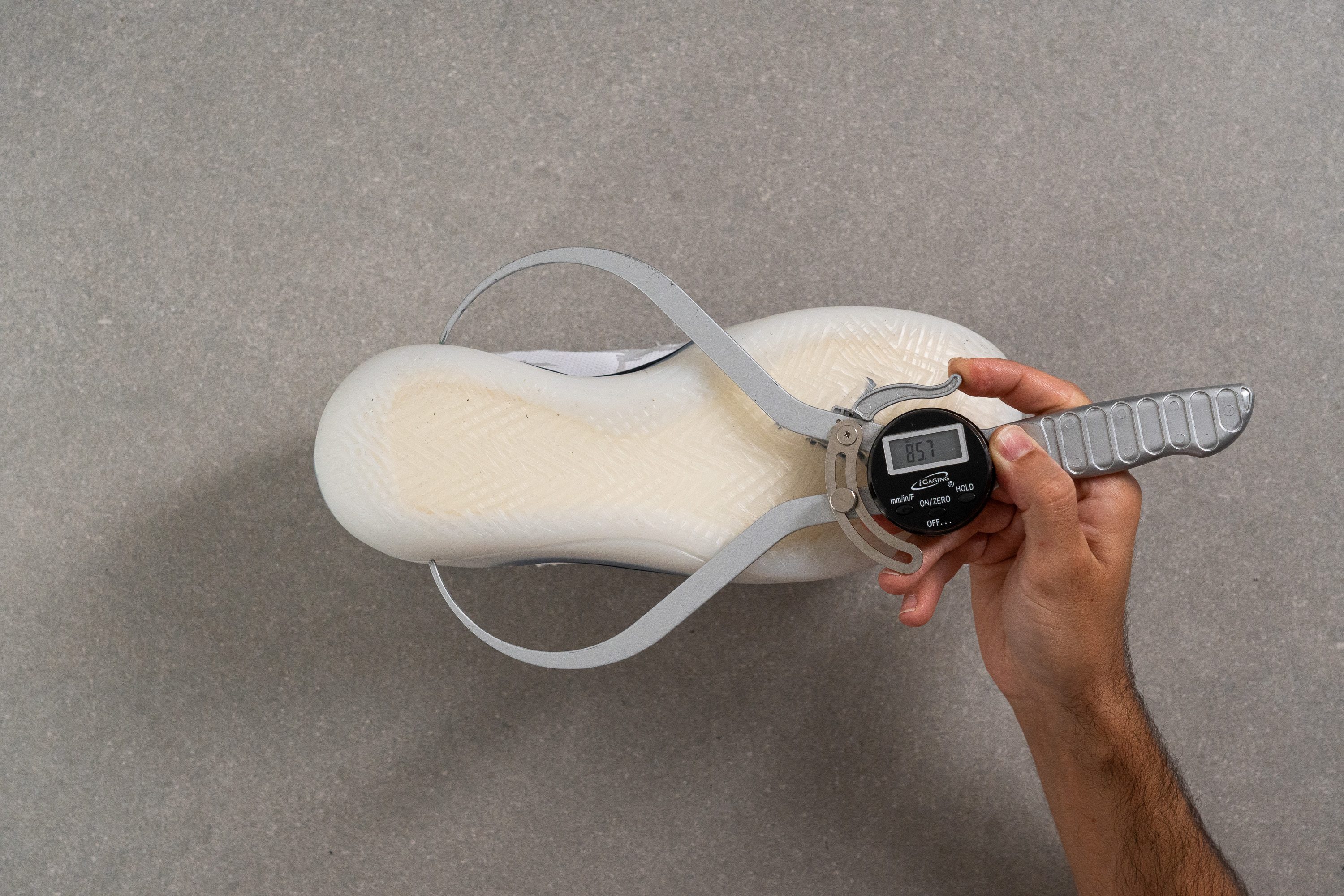
Even though this is only 5% less wide than average, trust us, it means a lot. The narrow design of the midsole at the rearfoot has a negative effect on the overall stability of the shoe.
We're not saying this AJ's problem could be fixed just by having a wider platform, but it would definitely help.
| Air XXXIX | 85.7 mm |
| Average | 89.7 mm |
Durability
Toebox durability
We're not gonna lie here, we did expect a great result in durability in exchange for that poor ventilation we just witnessed. So, we grabbed our Dremel and got the party started!
Rolling around at a speed of 5K RPM and with 3.2N of force, we saw white material flying around pretty soon into the test. Nevertheless, all this time analyzing shoes has taught us not to despair until we see the final results.
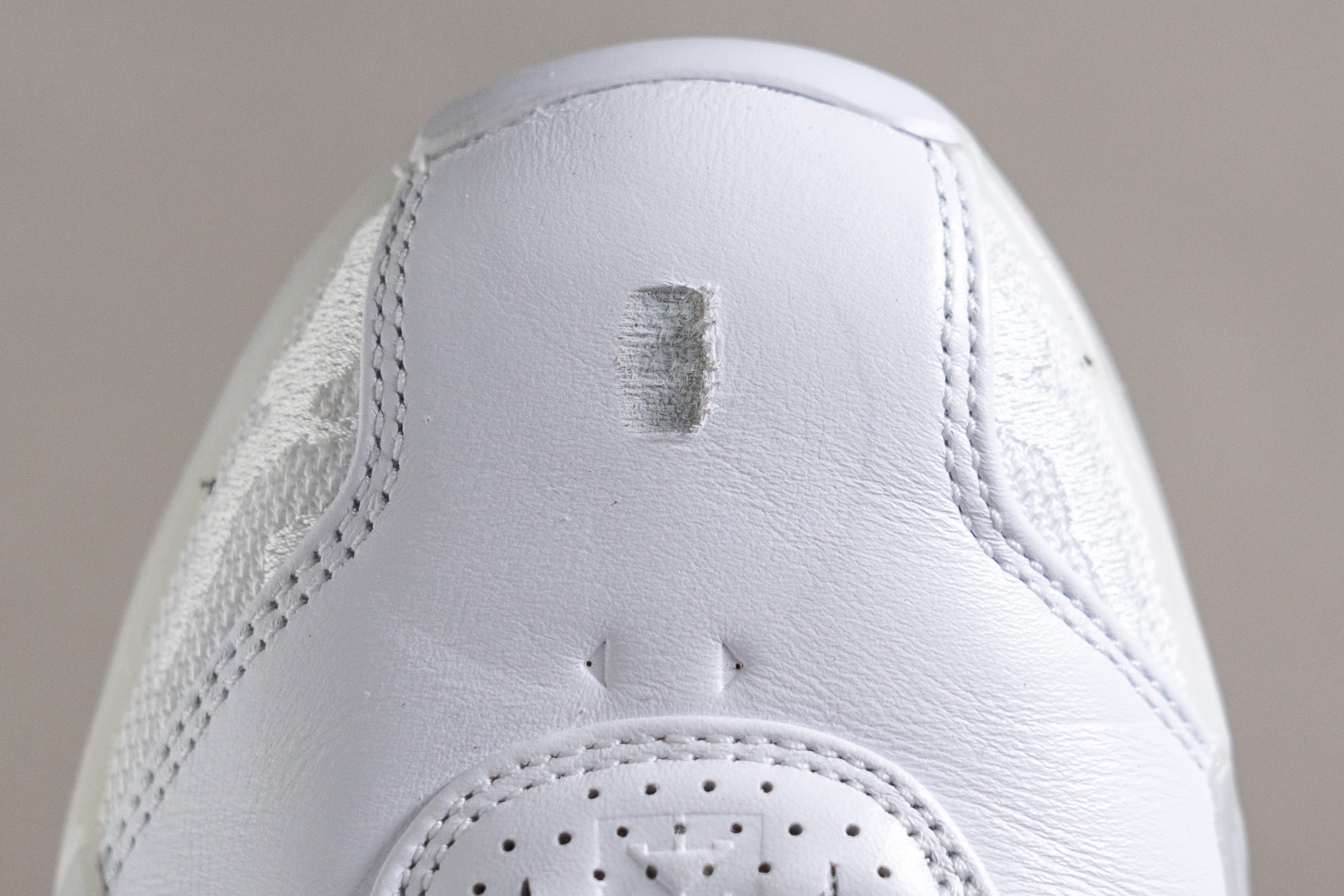
Alright, so this is what the shoe looks like after the Dremel's attack. As you can see, the tool couldn't just get through this shoe's thick leather layer completely. Still, the damage shouldn't be taken lightly, as it's not a mere scratch!
In conclusion, we have decided it deserves a solid 4/5 on our toebox durability test.
| Air XXXIX | 4 |
| Average | 3.7 |
Heel padding durability
Just by looking at it, we can say the heel is pretty padded. But don't let this trick you! Sometimes, extra padding doesn't mean more durability.
We turned on our Dremel again at 5K RPM and with 3.2N of force to attack this shoe for 4 seconds non-stop. Despite the amount of padding, we felt the damage was significant. Just not so much to actually raise concerns, at least in our opinion, but taking into account the constant rubbing basketball shoes have to endure in the heel... we expected a slightly better performance.
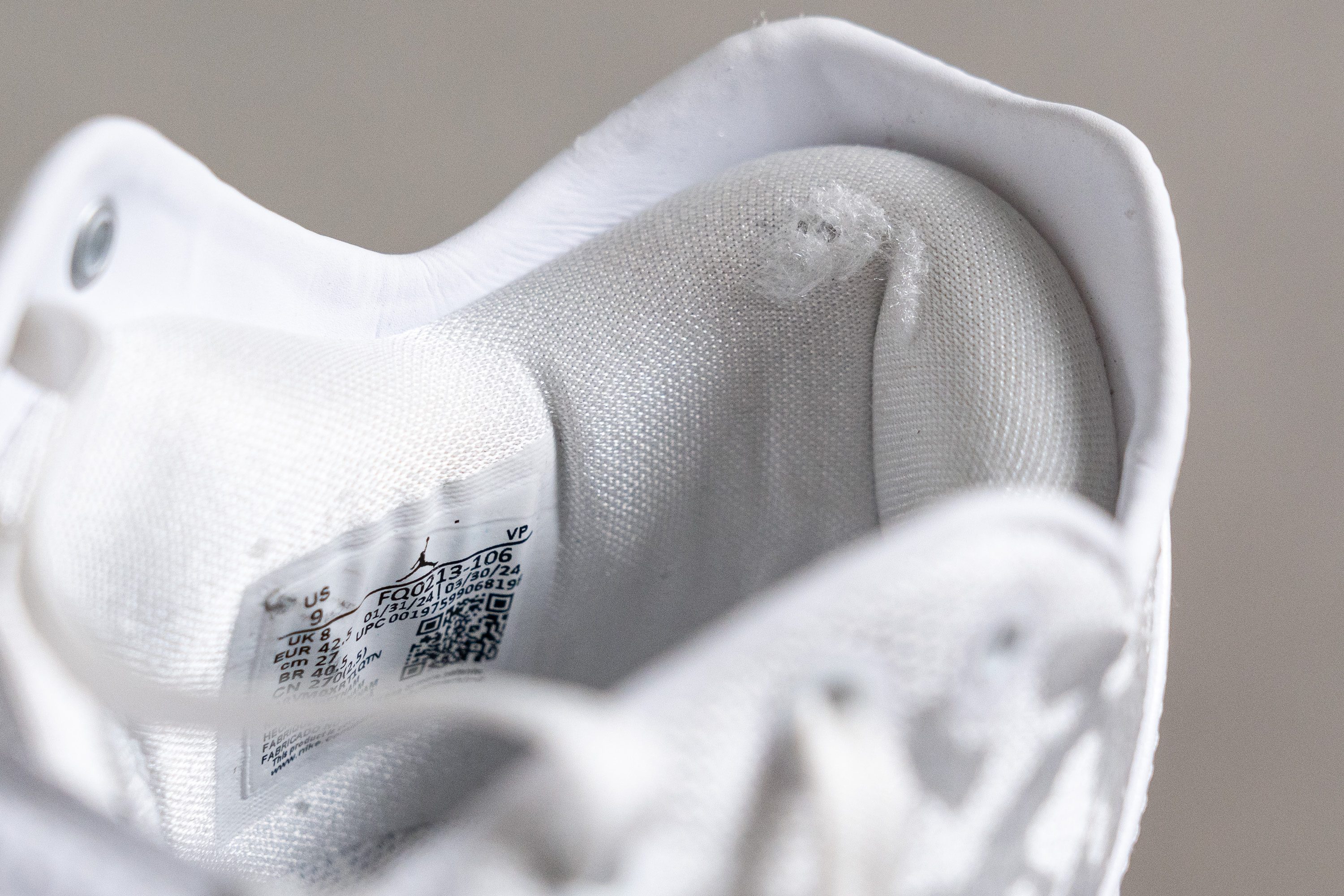
This is the final result. It looks pretty messy honestly, so we have decided to give it a 3/5 on our heel padding durability test.
| Air XXXIX | 3 |
| Average | 3.7 |
Outsole hardness
Our durometer returned 79.0 HC when we pressed it against the outsole.
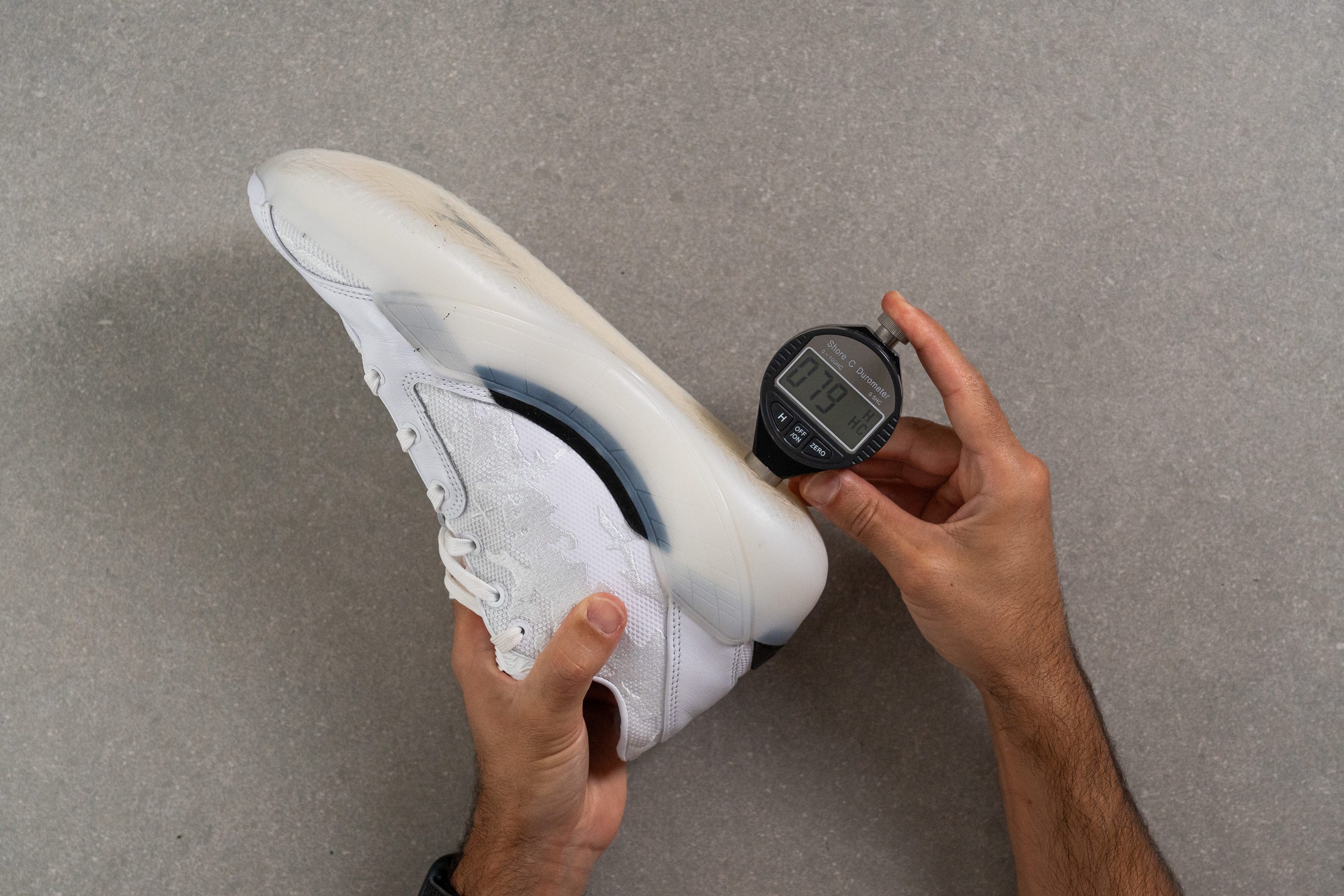
We believe this result indicates this AJ will offer a fantastic mix of durability and grip. But hey, we have specific tests to verify that, so stay tuned!
| Air XXXIX | 79.0 HC |
| Average | 81.5 HC |
Outsole durability
We gave our Dremel one last time to shine when we checked this shoe's outsole durability.
This time at 10K RPM, the tool drilled the rubber for what must've been the longest 22 seconds of this Air Jordan's life. Once the test was over, we grabbed our tread gauge to check how deep the dent was.
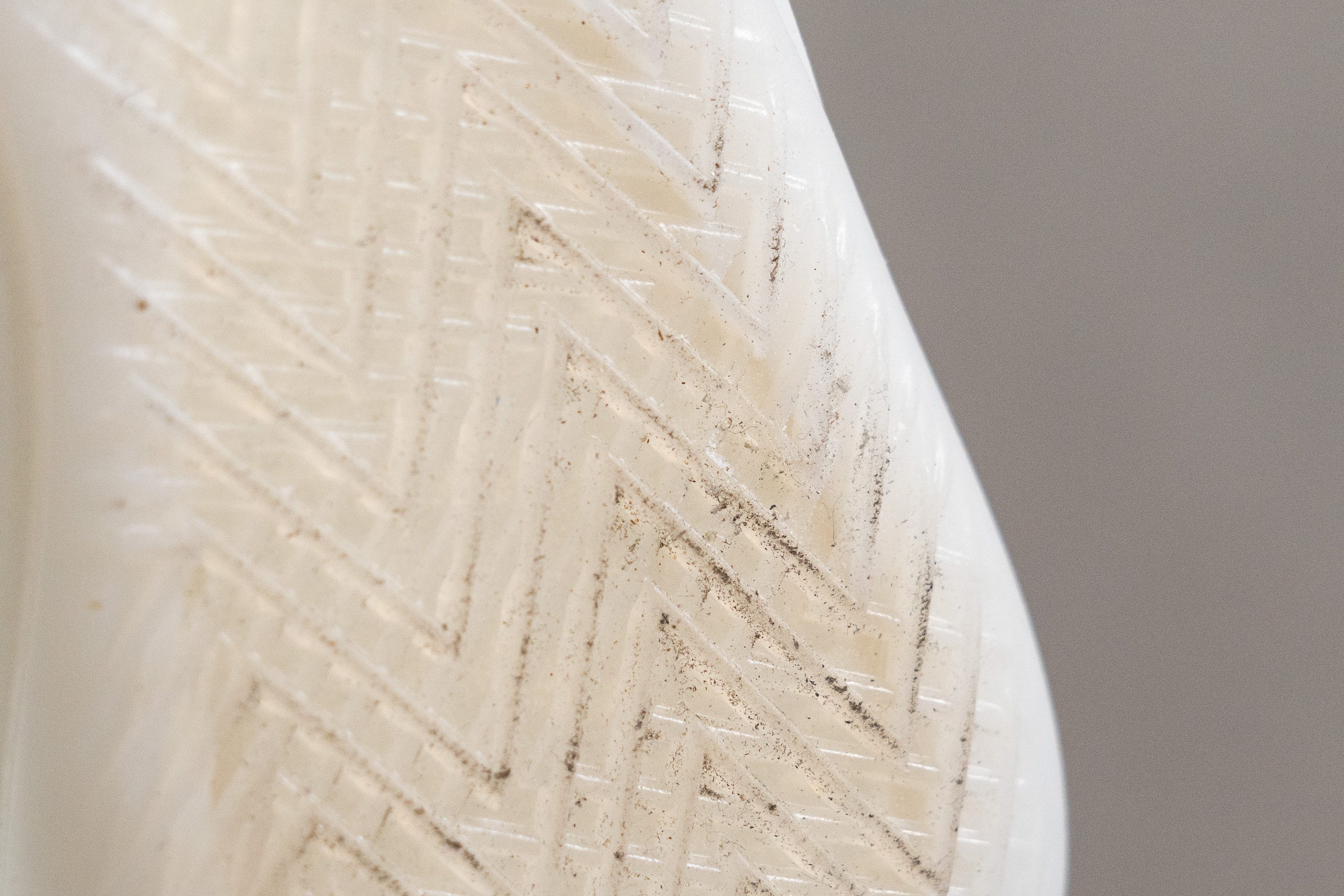
It might be a little bit hard to see, but the measuring tool returned 0.9 mm, which is a pretty good score. Even though this shoe might not be the best to play streetball, its outsole can definitely handle a couple of games easily!
| Air XXXIX | 0.9 mm |
| Average | 1.0 mm |
Outsole thickness
After checking the durability of the rubber used in the outsole, we were not surprised to see our caliper marking 3.0 mm when we measured the thickness of said part.
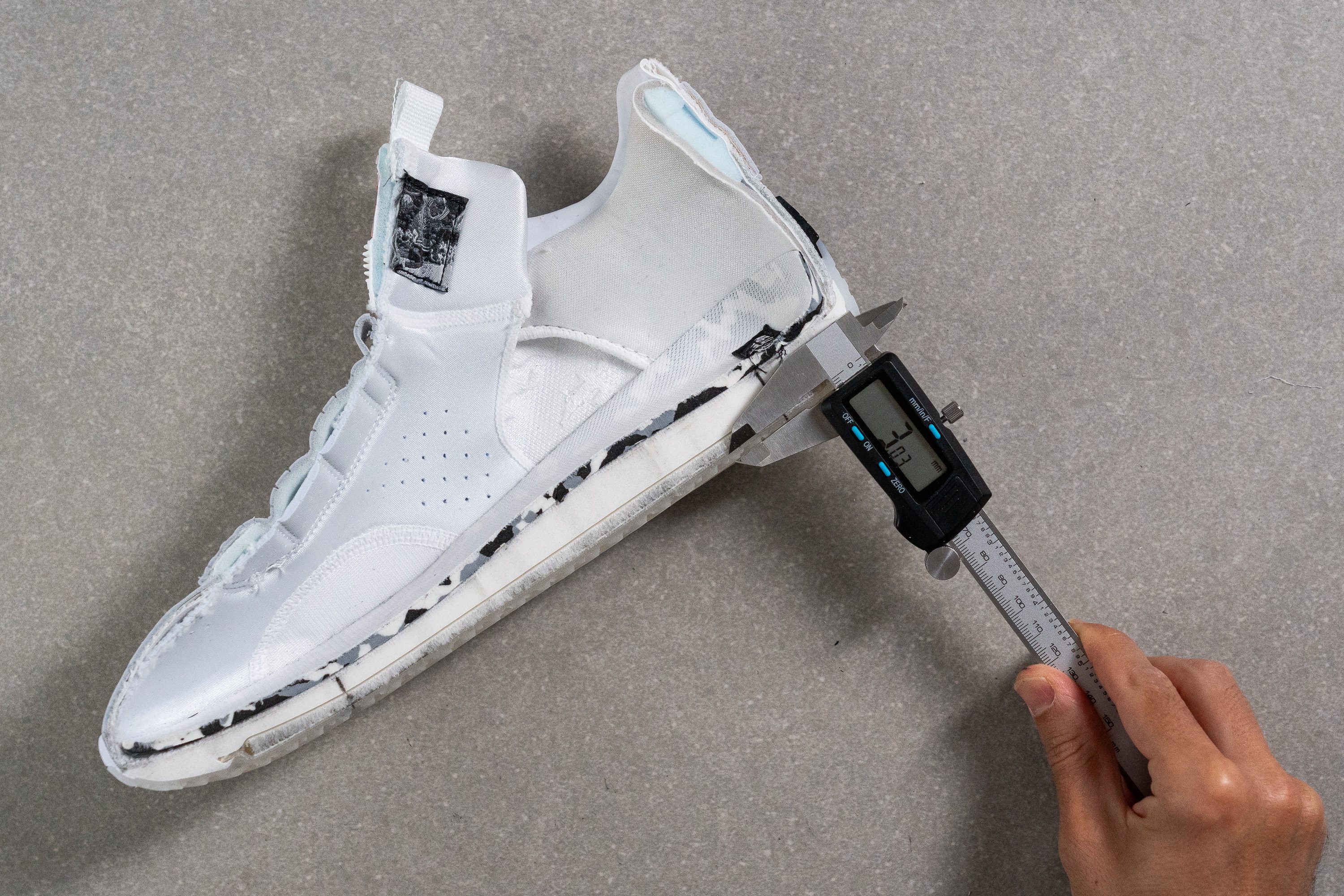
Consequently, even though this figure is lower than average, we weren't worried about its lifespan at all!
| Air XXXIX | 3.0 mm |
| Average | 4.0 mm |
Misc
Insole thickness
With such an incredibly comfortable midsole, who needs an extra padded insole? That's what we believe crossed Nike's mind. Nevertheless, the brand still went for a quite thick piece!
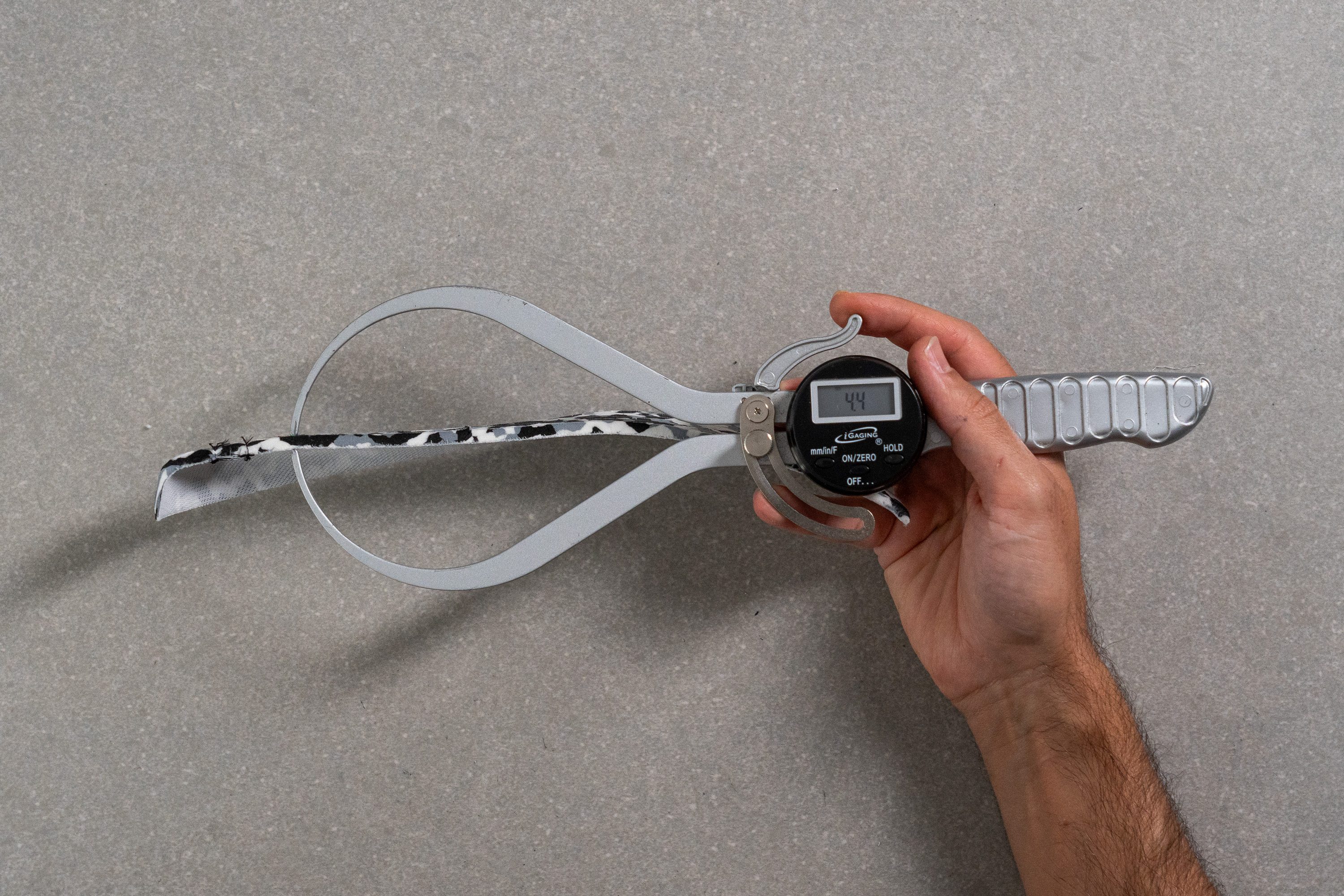
Our caliper returned 4.4 mm, which is pretty much average. Even though a thinner insole would have reduced the overall weight of this AJ slightly, we really can't complain.
| Air XXXIX | 4.4 mm |
| Average | 4.9 mm |
Removable insole
A removable insole! Yes!
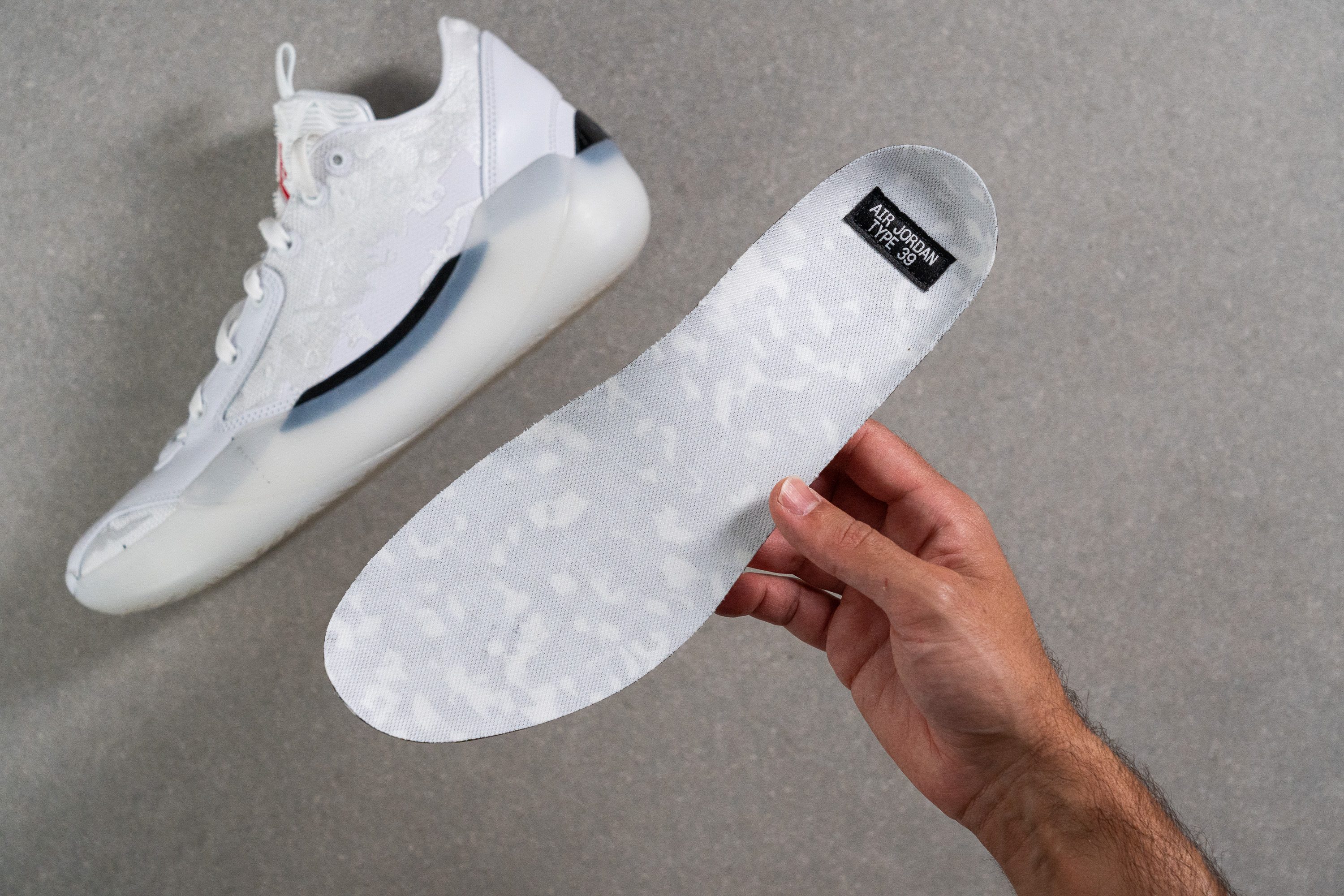
We loved that the brand decided to include a tag with the name of this shoe! But there's something that we like even more, and that's the fact that you can swap the standard insole of the AJ XXXIX and go for one that offers some more support!
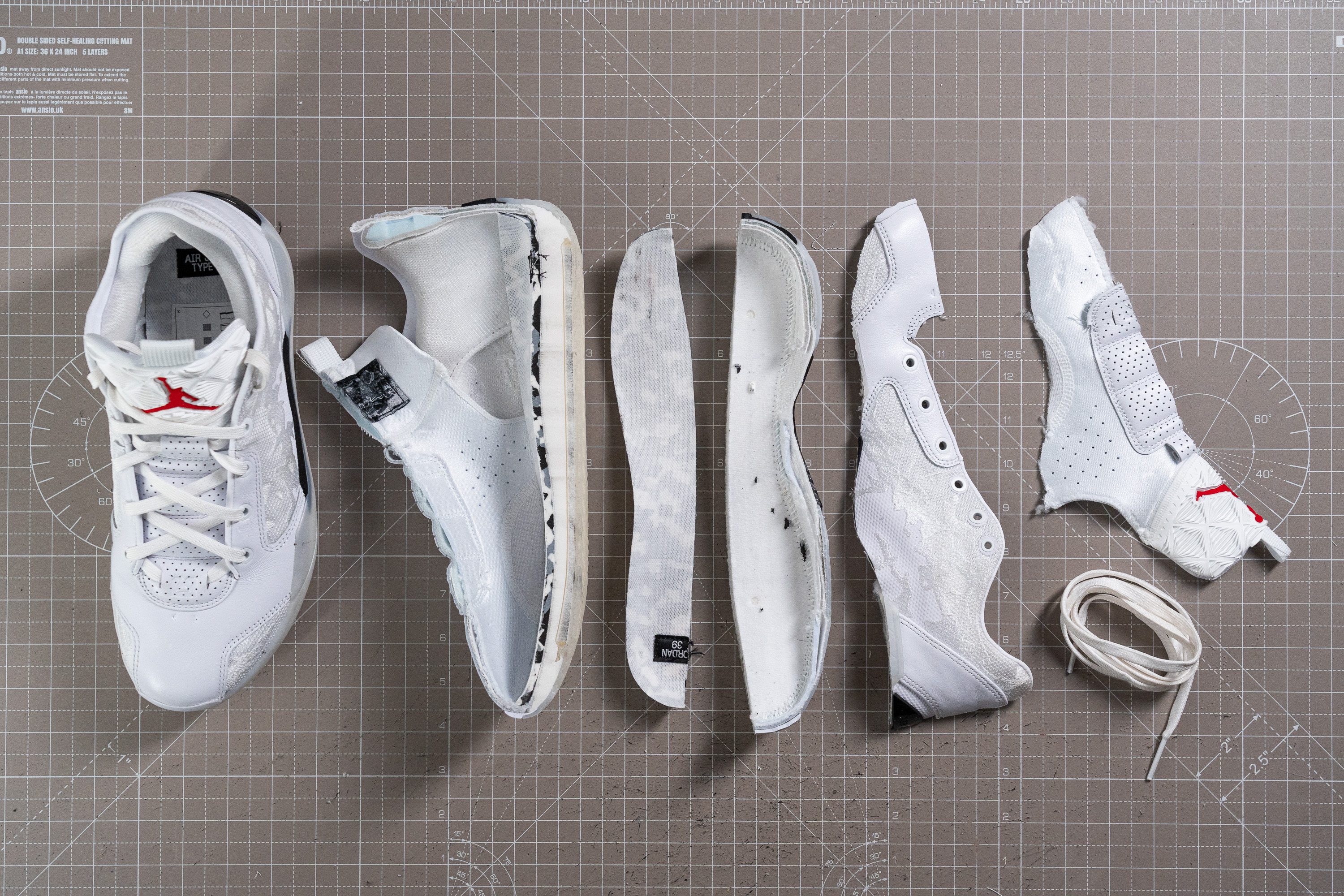
This won't solve all the stability issues, but it'll definitely give you a hand.
| Air XXXIX | Yes |
Reflective elements
This AJ doesn't have any reflective elements, but we don't think it needs them anyway. Personally, we wouldn't recommend this pair to play outdoors, and indoor courts should always have great visibility!
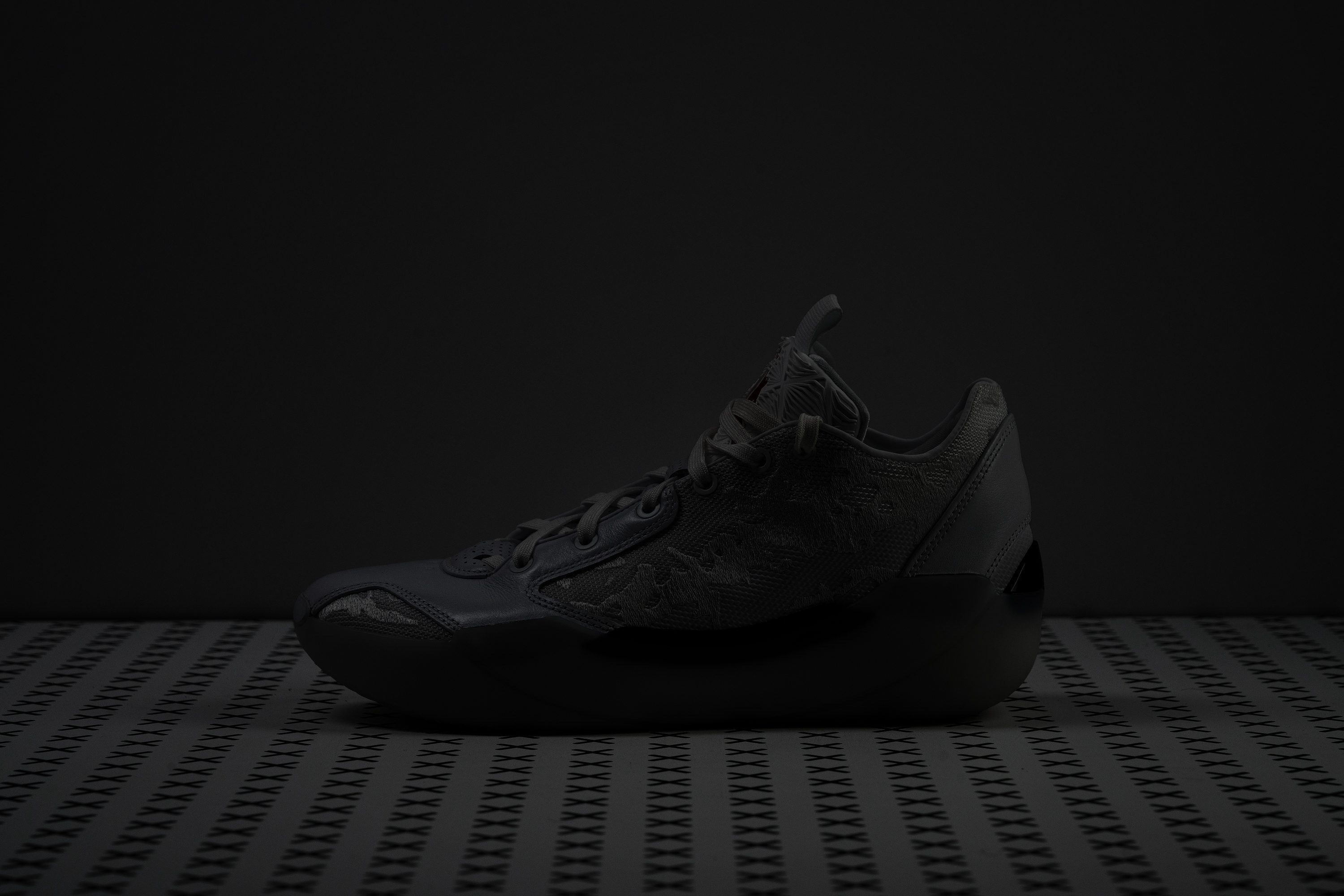
| Air XXXIX | No |
Tongue padding
We loved the design of this averagely padded tongue.
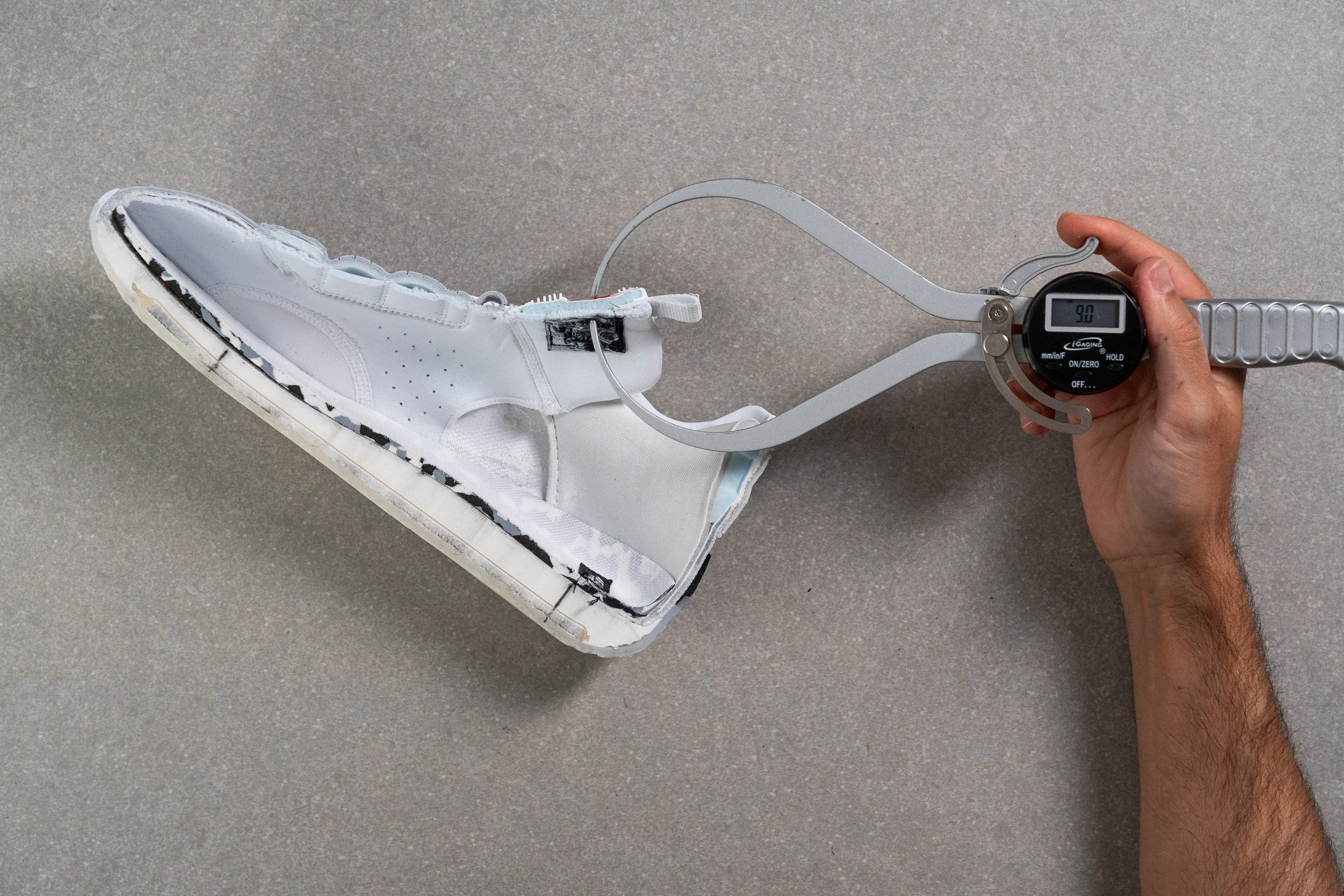
Its 9.0 mm of padding are spread throughout the structure focusing on the parts where the laces might hurt the instep the most, like the top.
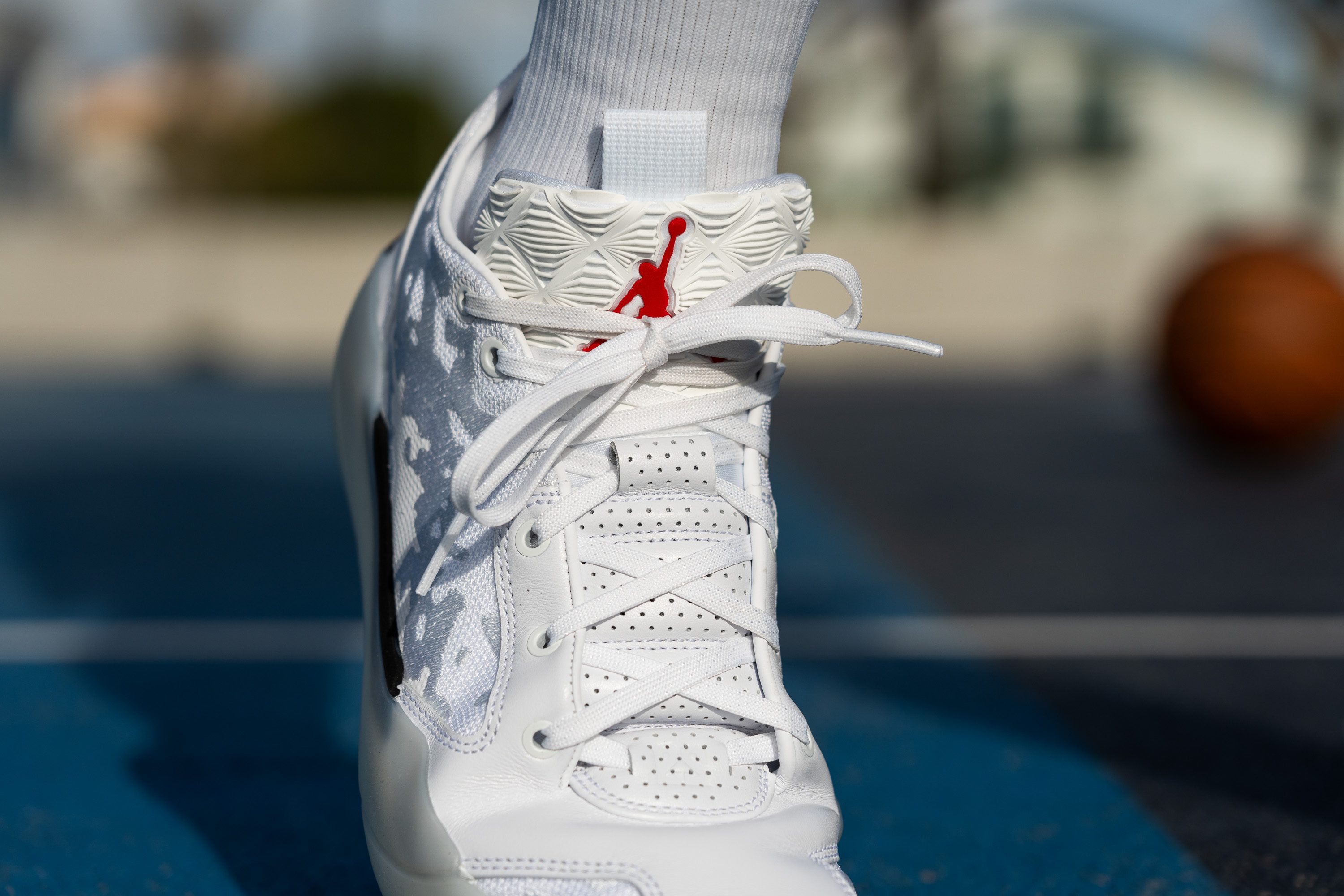
| Air XXXIX | 9.0 mm |
| Average | 9.3 mm |
Tongue: gusset type
A semi-gusseted tongue made our feet feel even more warmly hugged by this Air Jordan.
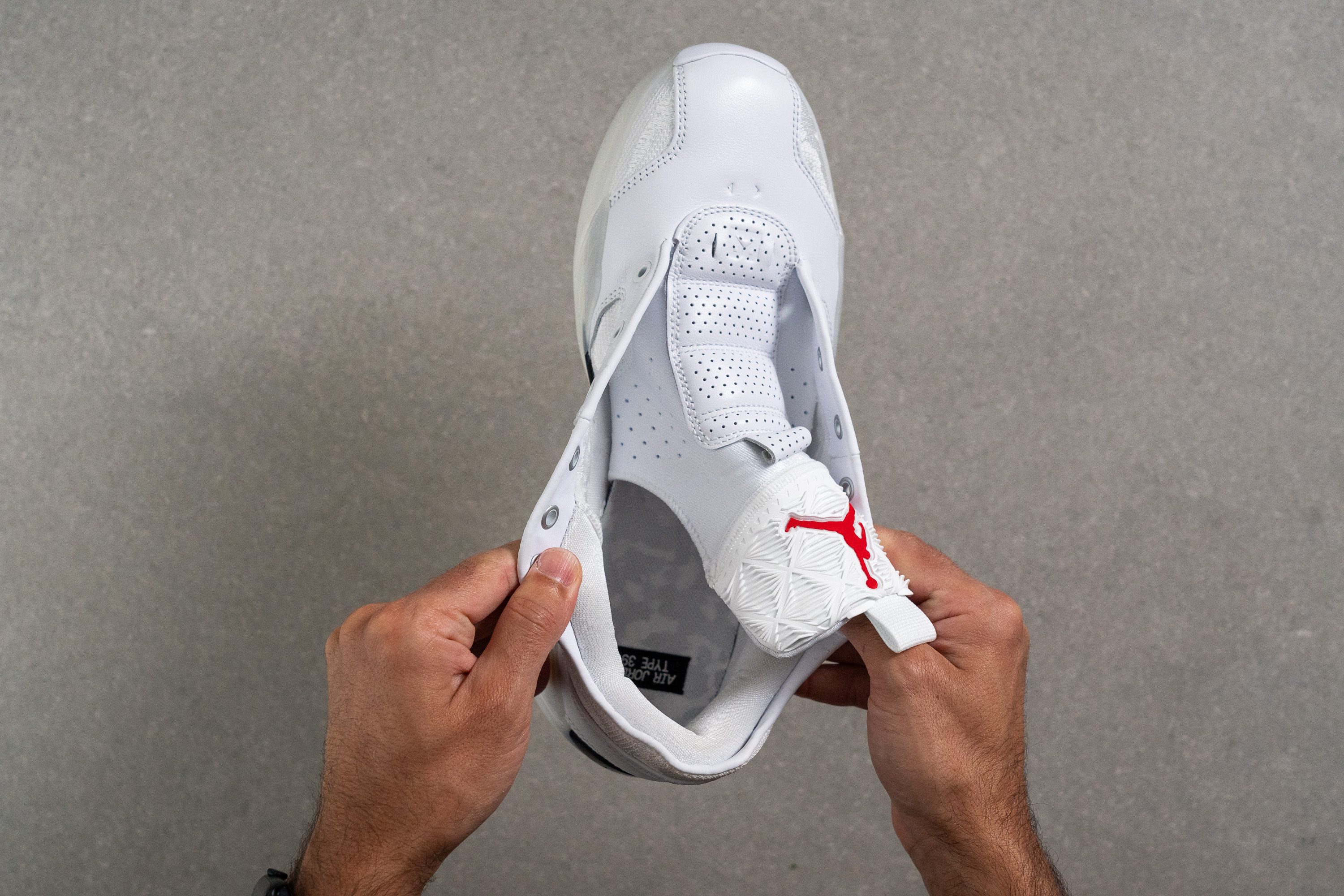
| Air XXXIX | Both sides (semi) |
Heel tab
Following what feels like a Jordan tradition at this point (yes, Luka 1, you're the exception to the rule), the AJ XXXIX doesn't feature a heel tab in the back.
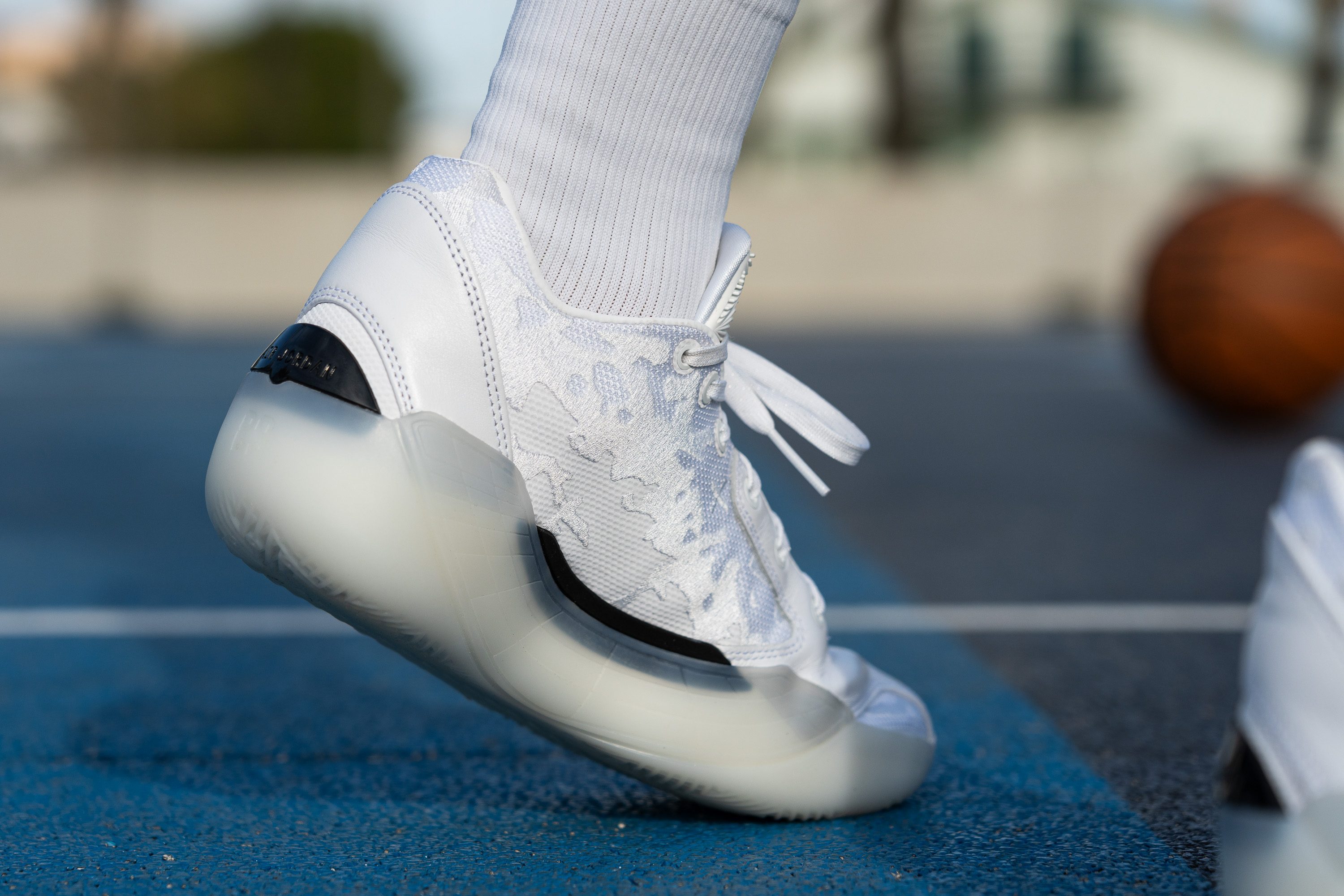
| Air XXXIX | None |
Price
We can understand where the 200 dollars this pair costs come from: its premium ZoomX foam. Its energy return and bounce are just absolutely otherworldly, and it's the type of foam that we see in top elite running shoes like the Alphafly 3 or the Vaporfly 3. And trust us, those are hella expensive as well!
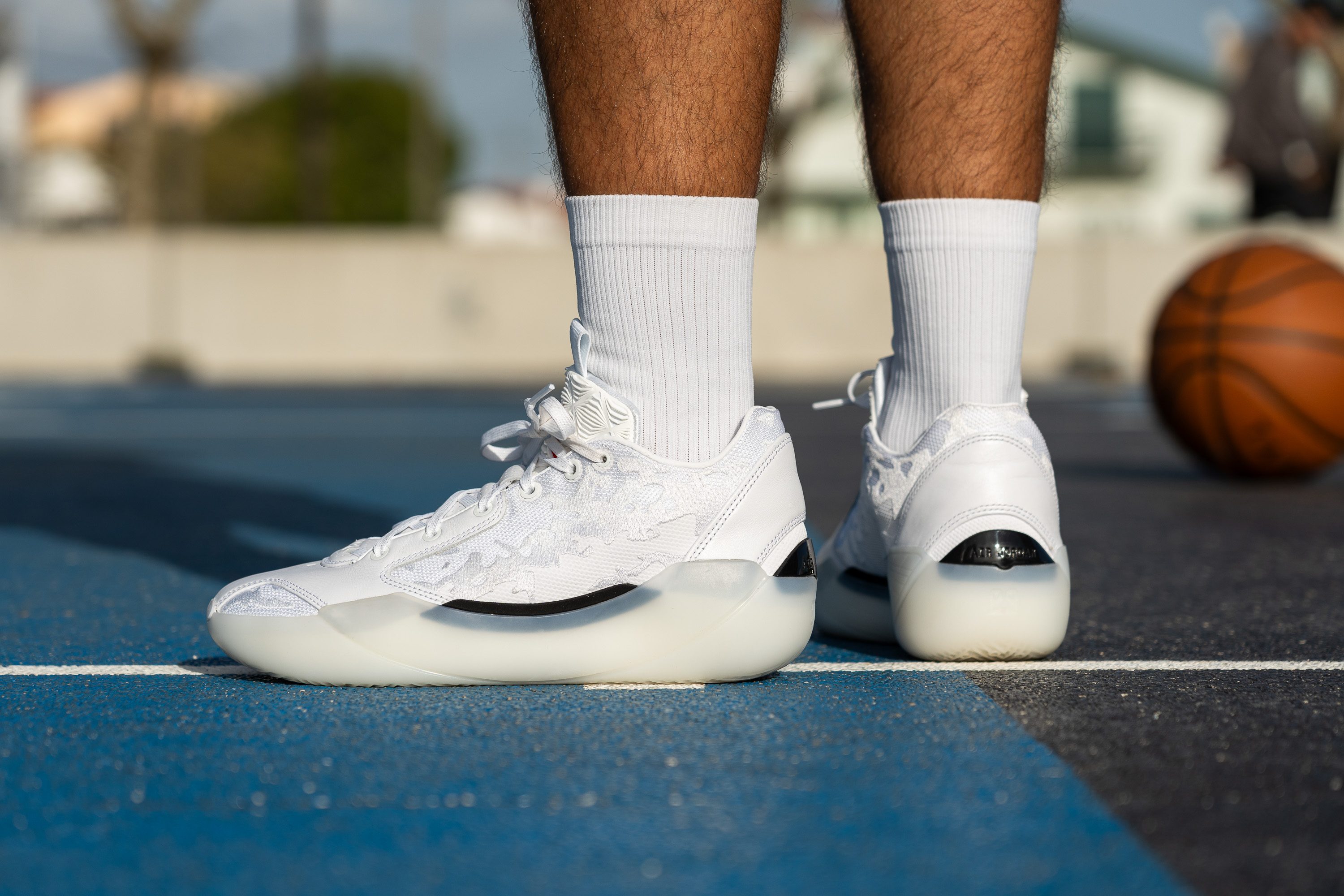
| Air XXXIX | $200 |
| Average | $136 |

